#isolation from his community and being raised away from his kind in an environment that is isolating for someone unable to
Text
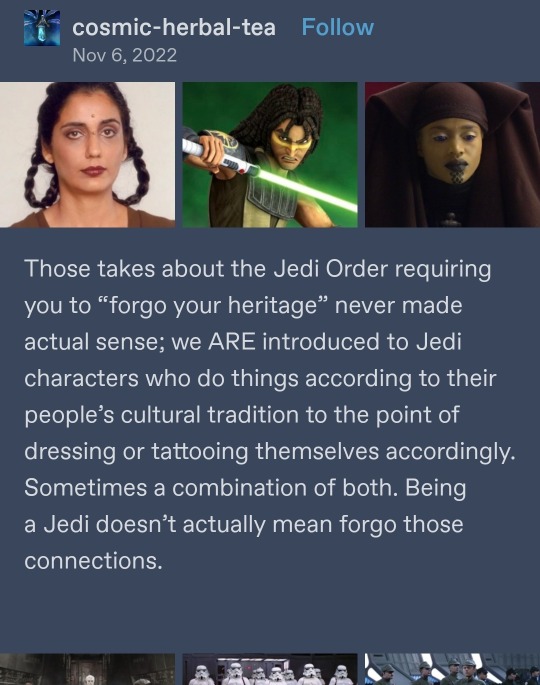
Posting a screenshot cuz I don't wanna go on a rant in the tags lmao
But shit like this feels weird to me. That isn't how culture or heritage works necessarily. It isn't just 'you can do your traditional tattoos and speak your native language' [even though yes those are important], there are so many parts of cultural heritage that would be lost when people are taken from their homeworlds and raised in the temple, even if they were raised with other jedi of the same species. The jedi religion and the temple and courscant all are part of that specific culture, the republic culture, the Basic culture or whatever. Raising a kid as a jedi is definitely taking them from their culture and raising them in a different one, no matter how many tattoos you let them get. They'd still be separate from the community and traditions of their homeworld.
People in the comments are talking about how jedi are encouraged to stay in contact with their homeworld and engage in the culture and I think that's great, but what about cultures that specifically have a lot of importance in familial connections? No matter what, the jedi are breaking the bond between the younglings they take and their cultural heritage and community and replacing it with the jedi religion and the basic culture. And with how the jedi do things [no emotional attachments at all, don't act on emotion], it can be damaging! And especially when a certain culture / species isn't common in the Order, imagine how isolating that but feel. I think about wookiee jedi which are canonically rare, can't speak Basic, and not everyone can understand Shyriiwook. Iirc the wookiee jedi in the new republic series canonically dislikes social events at the temple because they make him feel isolated since a lot of people can't understand him. And wookiee culture prominently focuses around community and family!
Etc etc etc it's just so wild to me to see someone say 'see! They can have tattoos, they're definitely allowed to connect with their heritage' like congrats to the jedi order you did the absolute bare minimum, it's still fucked up
#this is exactly what im exploring with my oc. a wookiee youngling who has to heal from the damage caused from#isolation from his community and being raised away from his kind in an environment that is isolating for someone unable to#freely communicate. plus who tf would teach a 2yr old wookiee youngling to speak in the temple. who raises the babies.#and like! wookiees are a good example since their cultures are so linked with the wroshyyr forests of kashyyyk#and removing them from that is definitely removing them from.their cultural heritage#since coruscant is 'a planet of steel and stone' like. come on#like people saying this shit dont seem to realize how important place can be for culture.#and removing someone from that place is removing them from the culture#im sure i repeated myself a lot here but whatever. hello from the resident star wars fan cultural anthropologist lmao#txt
9 notes
·
View notes
Note
I'm curious why do you think Dogma woulkd make friends with mouse droids
Honestly it just boils down to my personal interpretation of Dogma's character and the way he perceives the world around him.
He's still fairly fresh off Kamino so he's got that newbie trooper attitude (coupled with the fear and anxiety that's made him cling on so tight to his role as a perfect soldier), most likely got promoted to sergeant for his test scores (and I'll bet someone as meticulous about his duties and conduct as Dogma, would have pretty high marks right off the bat), and he's also on the fringe of the spectrum (not enough to be appointed as a maintenance clone, but just enough that others notice his peculiarities and social ineptitude).
Dogma is not easy to get along with right away (not for lack of trying but hey, when you have a bit of an attitude problem and a hard time reading between the lines, it's completely normal to slam into a communication barrier of sorts).
He's rather assertive, highly opinionated, and definitely has that stubborn and unyielding spark that makes the 501st so unique (even if others immediately think he's an ill fit for this battalion in particular due to his stringent behavior). He's also an anxious mess that overthinks situations when he doesn't have all the information, which leads him to jump to conclusions and formulate a plan based exactly on those very conclusions (ex: Deciding that to minimize damages he and the rest of the 501st should follow Krell without question, even at great personal cost).
It's not that he's inflexible to change, it's just that it takes him longer to acclimate to those changes. And, unfortunately, Dogma was simply not used enough to being outside of Kamino's oppressive grasp, to be able to relax enough that he could begin to assimilate the idiosyncrasies of his new battalion and environment.
Combine to that the fact others didn't quite understand why Dogma clung so tightly to order, and that Tup (the only trooper who seemed to get Dogma on some level) was much easier to befriend, and you end up with a trooper who is socially isolated for reasons neither he nor others quite understand. Which brings us to why exactly I think Dogma would befriend and even find some kinship with Mouse Droids:
You're alone. Well, actually that's not quite right. You were actually raised among millions of brothers, all of which share your face and voice but never quite understood you on more than a superficial level.
You try to show them you care in your own way. Cling tight to your teachings and convictions (things that have kept you safe for the entirety of your very short childhood), in the hopes that maybe your prowess will help keep yourself and your brothers alive.
And yet you're alone. Your one friend and closest brother is pulled away from your side by your older brothers. None of which really cast more than a disdainful look towards you because you're a bit of a nuisance to them. You're alone and you don't know why. And neither do your brothers. But you find someone who comes close to understanding what this particular misery is like. They don't look like you and don't share a voice or language, but you taught yourself how to speak theirs anyway. You share a need for a sense of direction and order. You understand your place in the universe. And yeah, they're maintenance droids and you're a clone sergeant. But at least you're not alone anymore.
Something something, the eternal quest of the individual human being is to shatter his loneliness. And if Dogma can't find companionship with his vode, then at least he can find some solace in a demographic that could definitely use some more kindness and respect.
#star wars#the clone wars#clone trooper dogma#mouse droids#headcanons#this is very much projection from someone who has a hard time understanding people or making herself understood even to her own family#and instead finding companionship in other places
35 notes
·
View notes
Note
i know kamisato ayato is a seer of space tho i disagree with classpects being like astrology i think astrology is so popular bc people unknowingly recognize the 12 base classes in them aka Deep Personality Stuff anyway what do u think lumine is i know she and aether dont have the same classpect
Isn't the core of classpecting deep personality stuff? A hero title is simply another way to label what you are like in my opinion.
Anyways, I will be under the assumption that your Lumine in question is the Abyss Twin.
With that out of the way, lets talk about...
The Abyss Sibling: The Witch of Hope
Witch: Active Manipulation class
One who changes their aspect
Alternatively: One who manipulates others with their Aspect
Hope:
Abstract: Conviction, Imagination, Fantasy, Delusion, Actual Hope
Literal: Light, Wings, Feathers, Religion
Despite how very little we have on the Traveler's kin, it's enough to glean off what kind of person she is and how she reacts to the environment she's surrounded by.
Let's start with her aspect of Hope.
People who identify themselves as Hope-bound are known to be motivated by their beliefs and sense of righteousness.

We know that the Traveler's Sibling is working with the Abyss in order to settle a score with Celestia, likely for what it has done to Khaenri'ah and its inhabitants.
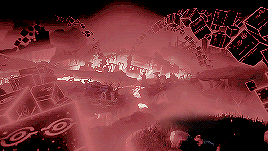

Already does she show her belief that Khaenri'ah's punishment was unjustifiable and that going to war with the divine was the only way to avenge their people, seeking to destroy those under the Seven Archon's rule first.
After meeting the archons, her revenge plot sounds sinister. But since we don't what she's witnessed and experienced, there could be a side of that plan that could hold some validity. Even if the Traveler doesn't agree with it.

The Hope-bound are also said to posses a vast imagination, using it to conjure up solutions to injustice and unfairness:

The Abyss order has many creative plots that the Traveler's Sibling surely has helped scheme. One of them using the water dragon Osial and a corrupted statue in order to create a mechanized god to fight Celestia.

The imagery is nothing short of gruesome, more so for a concept as light-hearted as Hope. But to assume that Hope is the aspect for goody-two-shoes, you would be sorely mistaken.

Next there's her class, the Witch.
Witches, along with Heirs, are the magicians. They manipulate their aspect in ways that they think will befit them and their circumstances.
Witch of Life Feferi Peixies was able to bargain with cosmic horrors to create dreambubbles, a sort of afterlife for anyone in any timeline who have perished. Even after either one's waking, dreaming, or both selves are dead, the person can still keep on living as a ghost within those bubbles. Which, in essence, keeps said person alive essentially forever. It was also used to communicate with souls from far away in their sleep.

Then there is Witch of Time Damara Megido who. instead of using her powesr to win SBURB, used her abilities of time-traveling to sabotage her teammates and lead their session into its doom.

In addition to this, a Witch's arc starts with the Witch's surrounding engulfed by their aspect to the point where it influences them. This influence usually has an extension that takes form of what we'll call the Witch's Familiar.
Feferi is the troll heiress of the Alternian empire and is determined to inherit it and change the lifestyle of its inhabitants for the better.
Since birth, Feferi was tasked in keeping her lusus Gl’bolyb pacified and hushed, lest she lets out the Vast Glub and erradicates all life in not just her home planet Alternia, but in the whole universe.

Look at thatt mother-daughter bonding!
Witch of Space Jade Harley spent most of her life isolated from civilization and was raised by her Best Friend/Best Dog Bequerel.
Bequerel is the First Guardian of Earth and possesses an array of cool powers, his most prominent one being able to bend the fabric of space to his will. A power that will be passed onto Jade once she goes Dogtier.

What does this tell us about the Abyss Sibling?
The sibling is considered royalty by the Abyss Order as well as a leader. As one of the few people who not only side with Khaenri'ah, but is also unaffected by curse afflicted onto them by Celestia, she stands as one of the ancient civilization's last hopes.
She has the conviction of their salvation within the palm of her hand and that same conviction engulfs her. Their dreams turn into her's, and now she mans them like a ship, with the Abyss Sibling as its captain.
Her virtuous campaign against Celestia though, may only be a delusion that not only harms innocents, but the people she is trying to help as well.
A crack of her well-intentioned crusade could be seen in the Requiem of the Echoing Depths quest, where her attempt to ease the suffering of the hilichurls only lead to them suffering more pain.

Although the Abyss Sibling is the pinnacle of the Kharnri’aian's salvation, their hopes aren’t the only ones that’s she’s manipulating:

The main character of the game, The Traveler, has only started his journey in hopes of figuring out what happened to his sibling.
Time and time again does she elude the Traveler's eyes, keeping just out of sight. The one time they do meet face to face though, she tells him this:


For the Traveler, there is perpetual hope in him that they'll be together again, and the Abyss Sibling turns that hope into a tether; a motivator for him to complete his journey and to understand the meaning of Teyvat's existence.

Perhaps she is manipulating her own hope as well, stuck so far down in her delusion that Kharnri’ah could be saved that she hopes once the Traveler has finished his journey, he comes to the same conclusion as her and they could once again stand against the Heavenly Principles together.

#ask#homestuck#classpect#classpect analysis#godtiers#witch of hope#witch#hope#hope aspect#Genshin#genshin impact#genshin lumine#genshin abyss sibling#lumine#abyss sibling#genshin aether#genshin traveler#aether#just realized that mayb they were askin 4 a short aner and not a full on analysis#oops
11 notes
·
View notes
Note
18 + 19 + 28 -> for ocs of your choice if you’re still doing it
these questions would be super easy if provided an oc but I’m incapable of picking one I’m actually dying. ok whatever ⬅️quotes from me that I typed out several weeks ago back then this was first asked. sorry
a memory that still makes your OC angry?
So this was difficult because like. Any specific memory I know a character has, especially one that still emotionally affects them to this day, is probably important to their backstory and as such I’ve definitely talked about it before at length so I don’t want to go over it again yk? So that leaves me with the other option of making shit up specifically for this ask game ok umm
I think the characters most driven by anger are Angel, Gloria, and Silence so I think. I’ll cover all of them very vaguely and not really answer the question because it’s hard aha so basically.
Growing up alongside other children, who typically did not like him for reasons justified and not, Angel has a lot of memories that make him furious to think about, like since the house staff didn’t really like him either they’d sometimes side against him for things that weren’t his fault. He doesn’t think about it often but whenever he does it still makes him mad to this day. He thinks it’s wrong to be like biased against a child but he
Something that makes Gloria kinda a contrast to Rocio and Angel as characters is that she does have a lot of like, experience in life for lack of a better word. She’s been around the world, she’s met and had some various types of relationships with other people, even though they were mostly very shallow, had a lot of different types of life experiences and viewed that as like, how her life was from then on. Except no she didn’t, because the whole time she was tied down to the past like mentally? I was going to say she’s probably had some experiences during her travels that she gets mad to think about but honestly I don’t think she does— these days she’s really good at just letting things go because she doesn’t get too attached to anything in the first place, so even if people have betrayed her or tried to kill her or some shit like that, it wouldn’t make her angry to think about. It’s like she always feels like she’s in search of something or running away from something because she’s still mad abt her childhood and feels like she hasn’t resolved her problems with it or confronted the issue in any meaningful way, so it stays with her yk? Most of what makes her actually genuinely mad is like. Following childhood trauma being raised by someone who didn’t seem to have any compassion for or understanding of you at all.
Silence lived in an environment kind of similar to Angel’s in that it was ran by like strict guardians who emphasized morality but it was like. A wider and pretty isolated community. So she felt like that was what the entire world was like, like she was basically trapped with everyone, and since the society encouraged emotional repression, she never saw anyone else displaying like the same dissatisfaction she felt so as far as she knew everyone was all the same. Started to like hate everyone she knew including herself and view people as fundamentally evil. (That’s part of why when meeting Cirillo she liked him so much like he was genuinely trying to be understanding. She thought he had an ulterior motive at first but since he didn’t have or want any power over anyone she eventually like warmed up to him yk.) She has a lot of bad memories of being punished or like shamed for getting mad and like raising her voice and things like that.
a memory that still makes your OC sad?
You know what’s interesting about sadness is that typically it doesn’t drive you to act so much as like anger or fear do, more so it drives you to like not act. Like to just give up and let things happen to you, yk, like be apathetic and stop caring. So it’s not as much of a motivating force as much as it is a hamper to your motivation. That’s not related to the question but it’s interesting 2 me. Anyway.
I think the character who feels the most regret about their past has to be Cirillo, but Ive already talked about him a lot and Jacinto is similar so I think I’ll talk about them instead. God they’re so hard to write I’m going to lose it I have to change something about their character. Them and Gloria I think could do with more focus/nuance, like more specific plot events to work with. But like anyway, I think a lot of memories, even ones they like thinking of in the moment, end up making them feel sad in the long run because they are pretty stuck in the past— the more they think of good memories with like their brother or their best friend, the more they feel like their life is basically over. That’s pretty dark I feel so bad about it I’m sorry 😞😞😞 they pretty much didn’t do anything wrong. I guess on the bright side, though thinking about older memories makes them feel like their life is empty Now, and they definitely are aware they’ve made mistakes in the past, it does make them feel like they have contributed something to the world in the past? Like their life overall had some meaning and so that helps them feel a bit more at peace I guess. It makes them feel sad, for sure, but in a bittersweet way yk.
is your OC a dog or cat person?
dog: rocio (only like hunting/working dogs), cirillo, gloria (only the cool ones, but the criteria for what makes dogs qualify as such is unclear and constantly changing. it’s pretty much whether she vibes with the specific individual dog immediately or not), tiago (I think he’d be the type to feed stray dogs whenever he sees them), jacinto (appreciates how theyre more straightforward to take care of, and more outwardly energetic and affectionate usually), joanna, joseph (thinks they are fun to play with)
cat: angel (likes both, prefers cats very narrowly. probably the place he grew up had a couple cats living in the building. also probably would have seen some stray dogs in the area though), laura, lucia, victor (actively dislikes dogs, scared of larger ones and annoyed by smaller ones)
^these aren’t all the characters ofc but I’m not doing everyone because the list got too long. can’t be bothered to try to remember every character there’s like 15 of them what am I Einstein 🙄
#I like talking abt ocs I promise#apparently more general prompts just make me explode and die#also this post kinda implies the characters can be sorted into categories of like#being driven by 1 primary emotion which ofc isn’t the case#especially because emotions can come from others yk#like anger coming from fear sadness coming from anger#I like talking abt that kind of thing because I think analyzing character motivations#is one of my favorite things abt making ocs#anyway thanks for asking for real :)#my ocs#I had more to say abt Victor and Jacinto#but didn’t because I wanted 2 finish writing this. sometime this month
2 notes
·
View notes
Text
Okay, we’ve been having Becca Butcher feelings on Reddit the past few days, so here we go with some long ass posts about her life.
Rape Mention TW; Abortion Mention TW; The Boys typical badness in this post.
One of these Reddit threads was about why Becca never tried to tell Ryan about the badness of life. Namely, that she was raped. So, we’re gonna talk about that.
Why wouldn’t she tell her son that she was raped? Well, Ryan is somewhere between late-elementary school aged and early-middle school aged. He’s like 10 or 11 at the most? Which would put him in like…somewhere between 4th-6th grade level depending on where his birthday falls and exactly how old he is. How easy is it to tell a child that he is the product of rape? Add onto that that this is her child, whom she loves, but she wishes that the circumstances that led to him being born didn’t exist or happen to her. Add onto this fact that this forces her to relive her trauma, which is something she faces in various ways on the daily, since she is raising the child that was conceived due to being raped. And also the fact that Ryan is an extremely sheltered child.
It is very clear that Ryan’s upbringing is some kind of compromise between how Becca wants to raise him and what Vought is willing to allow. They are isolated, in a fake community, with limited access to the outside world. Ryan had heard of Homelander; he knows that superheroes are a thing. But he doesn’t know about a lot of things that the average child in the “real world” knows about. This is because Becca wants to raise him as if he isn’t superpowered, away from the spotlight, and without concern for following everything on social media or the latest craze or what have you. Vought, of course, has control over the kinds of things that Becca is showing and telling him; they have cameras in her home.
Which also means that it can be very hard to have even generalized conversations, because Vought definitely makes sure to “gently” steer or correct conversations that are going too far.
She would never be able to say a bad word against Homelander or anyone else. Not to mention, Becca has zero actual support or friends. These people are playing along, because they know that Homelander is a liability, and they want to have a child who has his powers grow up in a stable, loving environment, and they want to have a failsafe to use against Homelander. Ryan is their tool to keep everything under control.
And because of all of this, Becca was never going to be able to explain things to Ryan, and even if she could generalize things properly, Ryan was always going to be too sheltered to make those real world connections to things.
Becca and Ryan’s entire lives are “caught between a rock and a hard place”. It’s a tragedy from the top down, and Becca is not at fault for not teaching Ryan “how the world works” or “what bad people can do” or telling him that he was conceived because Homelander raped her.
With all of that, people may ask why she made that choice to begin with? Why not abort? Why not tell Butcher? Why not run away from Vought?
There are a lot of different answers here.
Why not abort? It’s a superpowered fetus, and her pregnancy was said to be accelerated. Who says that it was even possible to abort? And even if it was, Becca seemed to be religious, and I don’t think she could have made that decision. She felt the need to protect that fetus, that child, and make sure that the child never turned out like Homelander.
Why not tell Butcher? She was protecting him from himself. She knew he’d do something. She knew he’d turn his anger and aggression on Vought and Homelander. Despite the fact that she says “But the hate that you carry and the warpath that you’re on, it started so long before me. I can’t.”, I don’t think she really realized when she made the choice to go to Vought, what Butcher would actually do if she disappeared. When she told him that, she had about ten years of hindsight to look back on, the knowledge of what he’s been doing in those years, and she was trying to get him to leave the compound without her to save himself.
Becca’s entire life since Homelander raped her is literally one tragedy after another, and she can never put herself first. The only time we see her put herself first in the entire “present” of the story is when she lets herself experience comfort with Billy and have sex with her husband again and just get to lay there in his arms, sharing a cigarette. That is the only time this woman ever puts herself first.
Why not run away from Vought? Oh, you mean an international company with superheroes, including a trained assassin who had already been around for like 40+ years since he was with Payback in the ‘80s and the most powerful superhero known to man in Homelander? Yeah, that would have gone over real well.
Becca was scared and alone, and she did the best that she could in every single decision she made. Was she perfect? No. But she did a fucking phenomenal job at holding herself together and raising a son who had her kind heart.
And in the end, she doesn’t really have any regrets. She would probably do it all over again if she had to go back to that day on the bench. Maybe this time, she would have tried to talk to Billy instead of just running. Maybe left him a goodbye note or something of the sort. Tried to get him to move on and not lose his life to the madness of his own war. But, she knows she did the best she could for Ryan, and that’s what truly mattered.
2 notes
·
View notes
Text
Secrets pt.2
Kai Parker x Female Reader/Character
Word Count: 2197
Warnings: typical tvd themes, mean Kai, they kiss at the end ;);)
Summary: Kai merged with Luke and started feeling different soon after. He got sick and the reader took care of him, throwing him into a fit of confusion. She doesn’t judge him for anything and has the understanding that he’s a product of his environment and acts out of revenge and distrust of others. Kai knows this after having a conversation with her and decides to find out all of her secrets too.
***since y’all like the one shots better than the series, I’m gonna write one shots for female readers under the name V for what I would’ve/will write in the series***
V felt even more like she was losing him now. When he went to get Jo’s magic, she went into the woods, her safe space, and begged to have her old world back, no matter how terrible it was, she wasn’t alone, she had a team, a family.
She was out there for hours and went back after the sun had gone down, silently hoping Kai wasn’t in the room. He was.
She opened the door and saw him sitting on a chair he had pulled between the coffee table and the couch. She closed the door with her back facing him and walked to the bathroom while taking her sweatshirt off, wearing a tank top underneath.
Kai grabbed her wrist as she walked past trying to avoid him, “someone’s had a rough night,” he said looking at her red eyes.
“And someone’s suddenly all better,” she looked at him expressionless.
He let go and looked away, “yeah… well…” he looked at the book he had in his hands, “turned out I wasn’t really sick, I just needed Jo’s magic and had Luke’s,” he looked back at her, still expressionless.
“Well, congrats, you can go back to being an even bigger dick now,” she was about to walk to the bathroom when she saw what he was holding.
“Why are you holding my journal?” she asked.
“Well…” he completed his coined dramatic pause, “I figured since you know all my secrets I should know yours,” she just stared at him so he kept talking, “SO, I got to reading, then I thought to myself, ‘self, this is way too personal to be reading alone, you should read it with her’, and so, here we are,” he smiled.
She didn’t see any malicious energies behind what he said, but still she asked, “what kind of game is this, Kai?”
“No games,” he said childishly, “have a seat,” he motioned at the couch.
She sat with her knees to her side, staring at him, waiting for him to start attacking her with everything she has in her journal.
“Let’s begin,” he said.
He crossed one of his legs over the other and flipped the book open, clearing his throat, “2007, age 10,” he read, “the last time I went to the prison world,” he stopped to look at her, “man you’re really obsessed with me,” he said with a smirk.
“Mhm, keep reading,” she raised an eyebrow.
“2007, 11th birthday, page 12,” he gasped in sarcasm, “what’s on page 12?” he flipped to the page and read, “I was at school, I didn’t want to go to school this day, it felt different. It felt like danger. I remember begging my parents not to make me go, but they did anyways, assuming I wanted to ditch on my birthday,” he paused to say, “those assholes,” before continuing, “I convinced Audrey and Kai to ditch with me into the basement right before we heard screams. We hid behind the vents behind a tall shelf and covered our ears when we heard the first bomb. The school crumbled onto us, but we couldn’t move. I remember begging in my mind that nobody would find us, I felt like they were here for us,” he paused again, “paranoid much?” and continued, “a group of people came into the basement calling my name, but I wasn’t going to say anything,” he looked up again, “hm, maybe not so paranoid,” and went on. “They got angry when they couldn’t find me and set the basement on fire before leaving. We almost couldn’t make it out after they left, but then I heard my dad calling for me.”
Kai flipped back to the original page he came from and looked at her, “that was tragic,” she kept staring at him, saying nothing.
“aaaand not so long after, ‘2007, 1 week after the first attack,’” he read and flipped to the page numbered beside it.
“Me, Audrey, Kai, and my parents made it to the western coast of Europe to find a boat. We traveled from Lyon to the coast of the Celtic Sea,” Kai paused again to say “I didn’t know that’s where you were from,” and chuckled before returning, “learning how to hijack cars on the way. We saw nobody the whole way. When we did, they were dead, or a monster. We didn’t know what happened yet. Everything was destroyed and I felt nothing. I went into survivor mode. We stole a boat to head towards America… we made it halfway before the waters got rough. The boat started filling with water until it was fully under. Everybody got onto a lifeboat except me, I was under the water. They started going without me until Audrey jumped and saved me. That’s when we made our deal.”
Kai gasped again, “is that why you don’t like the ocean?” he smiled through his next words and chuckled, “it is, isn’t it?” flipping back to the other page.
“You having fun yet?” V asked.
He ignored her, “what was the deal with Audrey?” he asked, “maybe it’s on this page,”
“Page 24,” she told him, “The good stuff you’re looking for is on page 24.”
Kai read again, “age 15,” he stopped again, “no dates this time, weird,” he continued, “we made it to America just days before it was attacked. We had enough time to find the community of hunters we came here for, barely. Angels were taking over. The biblical apocalypse. I don’t know what to believe anymore. My dad turned into one of those murderous vamps and we had to let him go. When we were captured my mom was killed. Me and Audrey made it out of captivity, I don’t know where Kai is anymore,” he trailed his next words, “he was with us when we were caught, he was with us through captivity, but he started to change. I woke up one morning and he wasn’t in his cell next to us. I never saw him again. I want to believe he’s dead but I know he’s somewhere far worse. It’s just me and Audrey now. We have the community but it’s thinning.”
V looked at her hands and back at Kai, “there’s letters I wrote him even though I knew I’d probably never find him in the back if you want to read those too,” she said softly.
Kai closed the book slowly and put it on the table between them, “I’m good, I think I have enough to figure you out now too.”
V put her feet on the ground, “cool, can I go now,” she rolled her eyes and didn’t give him time to answer before going into the bathroom to turn on the shower.
Kai leaned against the door and heard soft sobs and couldn’t help but feel a little bad about how he went about this.
When she came out of the bathroom Kai was leaning against the wall outside of it. She took a step back and waited for him to talk, “I need to run to the gas station, come with me?” he asked.
“I don’t want to,” she responded softly. He gave her a pouty face and she ended up going anyways.
They walked to the gas station to get snacks and drinks before Kai sat at the bus stop bench, “what are you doing now?” V asked annoyed.
“I want to talk to you,”
“You talk enough, constantly,” she responded. Kai just sat smirking at her, so she sighed and sat down next him, looking in another direction.
A moment of silence went by before he spoke, “I don’t know how to talk to you, V,” he gently placed his fingers on her upper arm prompting her to snap her head and look him up and down as her reflex response.
“That’s crazy because you’re always talking,” she snapped.
He took his hand away. “I think I care about you, but I don’t know how to talk to you, and I only have a few things I want to say,” he looked into the distance, and she looked at him, “just say them,” she said.
She looked into his eyes when he spoke, “I’ve done some… really bad things. Some I won’t even admit. But they haunt me, eat at me, and I can’t get rid of them. I killed my family, kids too. And it got me locked away for 18 years. I came back and killed more of them, I didn’t learn anything from being there,” she still looked at him, listening, when he looked away to finish.
“There’s times I’m afraid I’m gonna kill you too. Or anybody, really. It’s not a revenge kick. I slept on the couch because I woke up with my hand on your throat and I thought about it for a split second. My entire life I’ve been the freak, feigning for hits of magic like a kid on drugs. I became the coven leader, and nothing really changed,” he stopped and looked at his hands before continuing.
“Except now I can feel things and I don’t know how to process. I remember everything I’ve done and I know it was wrong, but part of me still doesn’t care,” he sniffed and looked the other way to avoid tears before looking back down, “everything I’ve done in my life has been the wrong thing. I don’t know how to do the right thing. When I was in that prison world there were times I’d try to end it multiple times a day, now that I’m here I think about it a lot because I know it’d work this time. I’m not a good person, V, I never have been, someone like you shouldn’t be around me.”
“Look at me,” she spoke, “your family sucked, not you,” she moved his face to look at her with her finger, “they isolated you because you were different and they didn’t understand, that’s not on you. They beat you, didn’t let you touch or come near anybody, treated you different, and over time you turned yourself into somebody they thought you were. You tried being who you were, but everybody around you acted like you were different, so that’s who you became.”
“How do you know all this” he whispered.
“When I look at you I can see past the things not even you can see in yourself. I can see who you really are in that deep place, and I can see who your family made you out to be on the outside. You’re not evil, Kai.”
“You know what I’ve done, V—” he interrupted.
“I know what you’ve done, and I know your motives behind it. I still think what you’ve done says more about your family than it does you, because that’s who they built. I see you on the outside and see something they built in their image. Underneath that I see revenge, hatred, and an aimed vengeance. Deeper I see someone who wants to let it go but can’t because they hurt every aspect of your being. But deeper I see that you just hurt, all the time, and it doesn’t stop, and I get it, you’re confused a lot.”
There was a long pause, Kai looked away and V looked at him still.
She sighed and scooted closer to him, “you aren’t evil. Not only can I see that, but you prove it. A real psycho wouldn’t have had the conscious to sleep on the couch or talk to me about anything. If you were really a psycho with no feelings, I’d either be dead or you wouldn’t be here because you’d break the pact,” she grabbed his hand and he looked at her again.
“Get it through your head this time,” she spoke soft, “you aren’t evil. I’ve seen enough evil to see it a mile away and I wouldn’t want you that far away from me.”
She interlocked their fingers as they looked at each other. Kai had an expression on his face that told her he wanted to close the space between them but part of him didn’t believe what she was saying, he was scared and frustrated with himself.
She took her hand away to wrap her arms around his neck, bending her knees up onto the bus stop bench to her side and got closer to his face, “believe me,” she whispered before laying her lips on his.
He placed a hand on her waist and the other on her knee, giving into the kiss.
They moved their lips together for what felt like minutes but was only a few seconds before V pulled away with her arms still around him, “do you believe me then,” she asked.
“If I say no, will you kiss me again?” Kai said almost speechless.
V pulled him into another, more passionate kiss, rubbing her thumb through his hair as his hand made its way up to hers, placing the hand that was on her knee behind her, pulling her deeper.
She opened her eyes slowly, “we should head back,”
“If you promise you’ll do that again, okay,”
“Pinky swear.”
#kai parker#kai parker x reader#kai parker x you#kai parker imagine#kai parker fluff#kai parker fanfic#malachai parker#tvd#tvd fanfiction#tvd au#tvd series
38 notes
·
View notes
Text
This AU idea absolutely will not leave me alone unless I write it down, so here it is: Dolores is not a mannequin, but instead one of the 43, and is adopted by the Handler along with Lila.
Dolores is not a hard baby to get, since she’s abandoned the moment she’s born by a nearby orphanage. The only thing the Handler needs to do is be quicker than Reginald in her baby-snatching, and she has the power of time travel on her side. Dolores is gone before a single member of the orphanage staff even notices that she’s there.
Unfortunately, the Handler is not good at childcare, especially not for a child that cries almost constantly. She pawns Dolores off to extremely awkward agents, and this does not help matters at all.
It turns out that this is because Dolores.
a) is deaf
b) her power is to read minds/emotions.
(This power does not mix well with time-travelling assassins.)
So the Handler...well, she doesn’t give up on Dolores, because that is still a useful power, but she leaves her to her own devices as much as possible while also still retaining the title of mother for the purpose of loyalty. It wouldn’t do to have Dolores go and read her mind, now would it? And the poor dear does it automatically, with no way to turn it off. A pity.
I’m going to put a read more, because this will get long!
So, Dolores grows up a little, and keeps out of the way of the agents when she can. Their thoughts are all dark and swirling and confusing, and they make her want to hide. Dolores can’t turn it off, but she learns how to keep it to the surface thoughts, and then how to turn them to background noise, easily ignorable. She also learns how to read and do sign language, and spends much of her time doing that in her room or other out-of-the-way places.
(Her favorite book is The Secret Garden, which I have not read (or if I did it was when I was like 8), but the vibes I get from it are perfect, so I’m including this factoid.)
When she does run into people, they’re often angry or dismissive, and so she learns how to be sweet and disarming. She can see people’s thoughts, after all, and she can see both the way that she can hurt the people who do interact with her, which feels bad, and what they want to hear from her. She still mostly stays away from people, and still is mostly ignored, but the people she does interact with think she’s the most kind and positive person they’ve met. The Handler especially likes to hear what she wants to hear.
Then, when she’s six, the Handler brings home another child. Lila is four years old when she comes to the Commission, and when they’re introduced, she copies Dolores’ power and immediately begins crying.
(Dolores doesn’t notice it much, but something is slightly off about the way her sister comes into her life. Her mother’s thoughts are a little different than usual, her outfit isn’t what she was wearing just a little earlier, and when she sees Lila again later in her office, the feeling is not one of a newly formed familiarity, but of meeting for the first time, and of surprise.)
Their introduction and siblinghood is therefore a slow sort of thing, where Lila learns how to not automatically copy Dolores’ power, but instead do it on command (the Handler’s command).
Once they get over the initial hurdles, though, they become fast friends and sisters. Lila is the Handler’s favorite, and in a sense only needs Dolores as something for her to copy. This actually works well for everyone, since Dolores was always acutely aware of the disappointment she was to the Handler, and both wanted to do better and wanted the attention taken off of her. Lila and Dolores spend their days separately, with Lila doing training and other activities while Dolores continues to spend time alone, but they spend evenings together sharing stories about their days. After an argument escalates to a week of silence, they promise each other to never read each other’s mind, not in the deep way.
(This is kind of like a Luther and Vanya friendship, if it was just the two of them and Luther was more excitable and Vanya was happier being left alone.)
(Also, Dolores knows that the Handler is a bad person, but everyone she’s met has been a bad (and/or deeply hurt) person except for Lila, and she doesn’t want to dash Lila’s hopes by telling her. Lila, on her part, isn’t supposed to read minds except on missions, and definitely isn’t allowed to read the Handler’s mind, at least not without express permission.)
Then, when Dolores is thirteen, she feels Dot ping something unusual. Something--no, someone--just landed in the Apocalypse.
Nobody notices as little Dolores, quiet in every way, sneaks into the Infinite Switchboard room. She knows how to use it, she grew up in the Commission and can read minds, of course she does. She pulls up a day about a year into the Apocalypse, not too close to the day itself, since she doesn’t know exactly when they land.
And there’s a boy.
He’s in a school uniform, and he's writing something on a wall in chalk. Math. Complicated equations, ones she doesn’t understand. His hands begin to shake as she watches, and he drops the chalk and hugs himself, trying to stop the trembling that has taken over his body. He looks sad, looks desperate in a way that Dolores both does and does not recognize.
She feels someone coming back, so she returns the Switchboard to its previous position and leaves, still thinking about this mysterious, sad boy.
From then on, they grow up some, all three of them. Lila becomes more skilled, more confident, and begins to go on missions, just some small ones. She glows when she gets back from these intelligence-gathering missions, giving Dolores a step-by-step reenactment. Dolores still sneaks into the Infinite Switchboard when she can, watching this boy grow up, admiring his perseverance when he can’t know there’s anyone else watching him, cheering him on. And Dolores adds math and science textbooks to her reading material, teaches herself what this boy already seems to know, wanting to reach through the screen to help, to catch the errors in his math that slip by him that he only catches days later and leave him to tear his work down and scream.
And it isn’t like Dolores knows him, really. He doesn’t know her. She doesn’t spend every day thinking about him, not even when he jumps in a blue warp that reminds her of the briefcases and realizes that he’s like Lila and her, he’s special. It’s just that she looks at him and sees something of herself, something the same achingly sort of lonely even though their situations are so different, and unlike with every other point in history, she knows that just her being there would help. She wants to help.
And, when they’re in their early twenties, when she catches a glimpse in the Handler’s mind about his potential, about what a wonderful killer he’ll be once he’s broken enough to accept a deal without question, ready to be molded to obedience, Dolores asks for him personally.
Dolores has never asked for much, and she knows the Handler has written her off as a mouse in a hawk’s den, a soft little cuckoo bird in an unfit environment. She doesn’t know that Dolores is a hawk too. She writes it off as a voyeuristic sort of crush from a quiet little girl, and moves up her timetable. After all, even if Dolores is harmless, she still knows enough to be a threat in the wrong hands, so it’s better to keep her close and content.
So the Handler brings Five to the Commission, and when the Handler finally leaves him to himself, when he’s clean and in fresh clothes for the first time in a decade, there’s a knock at the door.
Dolores has written a pre-prepared speech for him to read, about how she’s been watching him--in a not-creepy way, she promises--how she wanted to save him from the Apocalypse, how she had powers like him, how she can’t hear him, and how he had added the wrong columns in his last equation and he was now powers of magnitude off.
And as he reads it, brow furrowed in concentration and surprise, Dolores is overwhelmed by his emotions. His thoughts are whirling, and he’s definitely smart--maybe even as smart as her--but it’s the depth of his love and loyalty and determination for his family that gets to her. She loves Lila, and Lila loves her, but she’s never felt anything quite this strong, and strongly positive. Maybe it was the isolation or the survivor’s guilt or the need for a mission, or maybe it’s just all him, but she’s captivated.
When he reaches the end, he raises his eyebrows at her and mentally runs through his calculations, huffing in surprise when he realizes that she’s right, and that she noticed.
So, Five still becomes an assassin, but he also becomes Dolores’ friend.
Five learns sign language, and when he gets back from missions or takes a (probably medically necessary) break, they talk about math or books or the Commission or nothing at all. Sometimes they talk about his family, and Dolores gains all the blackmail available on his siblings from the first thirteen years of his life.
There are also times that he comes back from a mission looking haunted, and Dolores does what she can to make him feel better, to prevent him from falling the way so many other Commission recruits had into cruelty or depression or apathy. He has his darkness, and she knows it, can see it, but it doesn’t bother her. Why would it?
Five also doesn’t stop working on finding his own time travel equations. He hasn’t said much on the topic, and Dolores knows that if he has to leave her to save his family, he will. She also knows that he doesn’t want to leave her either.
It’s on one of their nights of math, one where they’re arguing about which model to use for some calculation or other, and he’s just not getting it, and she just sort of pushes at him, to make him understand, and he pauses mid-rant. He never does that.
He had heard her voice in his head, he tells her.
After that they work on mental communication when they can, use sign language other times, and things move on. Sometimes they sit together and read, making little mental comments to another as something interesting or stupid happens in their novel.
Dolores also begins to question the Commission, something she had never really done before. She had never really thought to question it, despite knowing that there was a whole world she had never been to that didn’t even know the Commission existed. What if...the timeline didn’t need to be fixed, didn’t need to lead to the Apocalypse? If the Commission wasn’t all-powerful, which Dolores knew it wasn’t, then what if she could do something about it?
So one night after Five gets back from a mission, tired and withdrawn and covered in blood, Dolores tells him that she’s coming with him. He smiles like sunshine, and she knows she chose right. The Handler could never look at her that way, she could never love something so truly, so deeply.
And Dolores knows then that she loves him, asks him a few nights later if he’d be interested in going out with her--no pressure if he doesn’t, she values his friendship more than anything, won’t leave him to himself or tell the Handler about his equations if he doesn’t want to--and his smile then is shy, and he doesn’t look at her as he accepts.
Lila does not like Five, never has, and does even less when she finds out that they’re dating. She says Five is stealing Dolores away, that he’s not good enough for her, that he’s not special even though he has powers like them.
(The Handler has the same opinion. Dolores is becoming too independent. She can see a secret rebellion in her eyes, can see the way Dolores is pulling away from her and towards Five, that pet project that kept going a bit wrong. It’s not hard to show Lila the same thing.)
(It’s also not hard to give Five a special assignment, a secret mission watched over directly by her. There’s a child that’s now an orphan, poor thing, it wouldn’t do to leave her. She takes the girl back, not only to the Commission, but two decades in the past as well. She smiles a shark grin when she leaves the child in the office of her past self, only just restraining the urge to break its bones, to go find herself and break her own bones. This girl, Lila, is and will be the perfect weapon in every way.)
Dolores tries to build bridges between Lila and Five, but it doesn’t work, and since she knows that Lila is loyal to the Commission, wouldn’t stand the plan they’re hatching, she pulls away from Lila.
Also I like to think they take an actual vacation (Five, waiting for your flesh wounds to heal does not count) and get married at some point in history. Who knows when! I don’t, but I know it’s very cute. They call each other “husband” and “wife” for a full month afterwards without ever using their spouse’s given name(/number). I love them so much.
And then, one day, they crack the code. They can’t travel with the briefcases, since those leave traces for a few days that can be tracked. Also, when an agent is in the field disrupting the time stream, the Infinite Switchboard gets a bit hazy and fuzzy because it needs to recalibrate and calculate about the new timeline that’s being created, so they won’t be able to be tracked for a while that way either.
(Me, answering the plot hole that the show didn’t bother to cover of why they needed to put a tracker on Five when they had the Infinite Switchboard, and also why they lost them ever???)
(Also this is why they go to 2019 like a week before the Apocalypse, because that’s about how long the Infinite Switchboard will cover their tracks and the Commission has to go in blind. Also also that’s when Harry Janky shows up and if they just stop him from meeting Vanya things should be mostly okay, and then after the Apocalypse doesn’t happen things should be more or less set (maybe, time travel in this show is weird).)
It is now that they gather information on the Apocalypse, stealing the file from Dot. Though Dolores had been able to use the Switchboard to view the aftermath of the Apocalypse, the event itself was locked, only accessible to a higher management that was never around. The Handler had access, of course, but she had used her time training Lila to train her own thoughts as well, and the probing necessary to find the information, either the codes or the details of the event, would have alerted her and ended their plan there.
Five learns that his favorite sister causes the Apocalypse :(
This is actually a real blow, but seeing the way that Harold Jenkins and the Commission manipulated the situation helps him reckon with it, and while it’s still a lot on Vanya, it’s not like it’s just her at fault. And besides, when he messed with his powers he ended up stranded in a post-apocalyptic future and then ended up working as an assassin, so he understands about the unintended consequences of their powers and also committing mass violence. He can also get therapy about it after the world is saved, which he won’t, but he could.
They have the information they need, they’ve got the equations worked out, and Five is opening the portal when Lila walks in on them. (I guess Dolores either took another briefcase to the Kennedy assassination or just hopped a ride on Five’s, or maybe they went somewhere else completely. It’s not really relevant.)
Lila Is Not Happy.
There’s a bit of a fight, and Lila is too late to stop them from going through the portal, but she’s been practicing with Dolores’ power, and though she hadn’t realized about the mental communication, she had found another aspect of the power: removing/suppressing memories.
So, as they go through, Lila erases their memories of what causes the Apocalypse: Vanya, her powers, Harold. She doesn’t get the eye or Five’s time in the Apocalypse because she’s just erasing those recent memories, not those old, cemented, formative ones. She also messes up the equations, just by a decimal or two. Later, she couldn’t tell you if that was an accident or not.
(Then she gets beaned in the head with a fire extinguisher, just for the fun of it)
(Also all of this is because I realized that if Dolores could find Five with the Switchboard she could see the Apocalypse and they could just avoid the whole mystery mess of season 1, which I did not want. I just wanted season 1 + Dolores, so I had to scramble to fix that, lol)
So, the Hargreeves siblings, all 5.5 of them, run outside to see a glowing blue portal, and their thirteen-year-old brother who had been missing for seventeen years falls through, looking the same and accompanied by a thirteen-year-old-girl who, after a minute of confusion and frustration, he introduces as his wife. Also there’s going to be an Apocalypse
(I have just realized that I have capitalized “apocalypse” the whole time and I don’t think that’s right, but I’ve been writing this for a while and I don’t wanna go back and fix it)
So yeah, then it’s season 1 + Dolores and maybe Lila!
I 0% have it in me to write anything about that right now, and my idea has mostly been on what I’ve already written, so that’s where this ends for now.
So, yeah! That idea just would not leave me alone, so I had to write it out. I always have more to say about it, and I’d love to see other people’s thoughts!
Oh, and one final thought that didn’t fit in to the narrative but I desperately have to include it:
As adults or as children, everyone looks at Five and Dolores, sees the annoyed and blunt boy and the kind and positive girl, and they think they know which one of them is the pessimist and which one is the optimist. They are wrong.
Listen, Dolores heard the thoughts of assassins for her whole life and saw the hurt or the cruelty that came with it, and intimately knows the worst things about humanity. Five lasted in the Apocalypse (for like ten years in this, but we know in canon he had it in him to go to forty and beyond) on nothing but willpower, a love for his siblings, and a belief that he could make things better.
It’s one of Dolores’ favorite things about him
She brings this up in conversation at a family dinner one night after things are all settled and the siblings all lose their goddamn minds
Five is very embarrassed by this
It’s lovely
And another actually final unrelated thing, Dolores gets him in his twenties because of the line in the show about them being together for “thirty years” when he was in the Apocalypse for forty, meaning they “got together” in his twenties. In this case it’s a more literal, physical “getting together” (aka meeting in person) than a romantic one
(This also means, depending on how you skew the timeline of this, that Dolores and Five are around the same age as the other Hargreeves when they go to 2019)
(Well, physically they’re thirteen, but still. I just think it’s funny that they could go down such different time paths and end up in pretty much the same relative spot)
Anyway, thanks for reading this far (an impressive feat), and I hope you enjoyed it!
#tua#the umbrella academy#five hargreeves#five tua#dolores#dolores tua#tua au#au#handler's daughter dolores au#long post#very long post#too long post?#it's over three thousand word that's too much#it's just like the diego causes the apocalypse au i wrote#i start writing#then i lose time#and it's a few hours later and there's a several-thousand word au#also i fell in love with dolores while writing this#she's great#oh wait i should also tag this as#delores#delores tua#i have only recently accepted that as a valid spelling of dolores#i mean i know it's a real spelling but i don't like it#if you like it you do you though
153 notes
·
View notes
Text
Fundamental Understanding of Body Language
Importance of knowing body language to avoid contradiction between what we say and what we do to increase the credibility
Body language is the first method of contact among humans. Since ancient times the body has been an irreplaceable instrument of communication before speech and written language.
We are permanently communicating and under the scrutiny of other people, even without conversing with them, during walking alone in the park, riding the subway, going to the university, etc. According to the body posture, the way of walking, and the expression of the face and hand movements, we can decipher the inner state of this person.
People observe our body language while communicates to others through gestures and movements, the thoughts, and emotions we are feeling at that moment. The body sends permanent messages to our brain, affecting our mood; therefore, if we assume an upright position, our mood improves immediately; if we take a stooped position, our mood decreases.
Being conscious of the significance of body language for a better coexistence in society improves social relations and helps build a better world; more humanistic, creative, empathetic, productive, where you can live and act in freedom.
Why is body language always a topic of discussion?

Man is a social being who constantly communicates with his environment to satisfy basic needs that allow him to stay alive, such as food, health, clothing, education, etc., and develop in society. It is challenging to live in isolation without communicating with each other.
In recent decades, there has been a significant trend in positive psychology in the study of body language and emotional intelligence. Previously, there are scholars to study negative emotions, now they have focused on the study of positive emotions of the individual, and the results have been surprising.
Scientific research has discovered that the key to human development and growth depends on people's mental state; their levels of satisfaction and happiness are directly related to creativity, production, and performance, based on the ability to communicate and interrelate with their environment.
Experts affirm that 93% of what we communicate, we do it through body language. If we cannot manage our emotions and maintain synchrony between thoughts, feelings, and words, our own body oversees contradicting what we say. This contradiction directly affects our credibility with others, with negative consequences for our personal and professional growth.
Why is body language important in a job interview?
Companies are concerned about choosing a professional with the right profile for what they are looking for, thus saving time, money and improving the company's conditions. The success in the selection of the candidate for a job is the success of the company. Thus, be mindful of every detail when communicating; a small oversight can provide an excellent opportunity for both parties.
An extraordinary resume is not enough; it must be strengthened with skills and personal characteristics, which can only evaluate during the interview. In the job interview, several elements are involved, and the body language adds credibility to the presentation speech.
From the moment you arrive at the company's physical headquarters that will conduct the interview, your evaluation starts from the manner of dress, verbal, and body language. In these moments, special attention and focus on the gestures that accompany the word and express the emotional states that the person experiences in those moments.
With technology, some companies implement strategies that allow you to observe the job candidate online or in the waiting room before the interview. This technique will enable you to observe behaviors that indicate insecurity, stress, or anxiety. The candidate could be monitored and evaluated, his presentation, punctuality, and behavior. The interviewer accomplishes this observation through observation and a practical understanding of body language.
The employer knows your resume, which demonstrates strengths and skills. The interview seeks to discover and evaluate your personal ability to meet the different challenges within the organization successfully.
Inappropriate language can send the wrong signals and impoverish the interviewer's perception of you. You should not only take care of your physical appearance, but it is also essential to take care of the way you carry yourself.
Your verbal answers may be flawless, but if your body language shows signs of nervousness, insecurity, fears, it can negatively affect your chances of getting the job of your dreams.
Through body language, the interviewer discovers your level of security, optimism, and self-control, which, added to your physical presentation and resume, increases your chances of being hired.
It is fundamental to handle the presentation speech, workings on ourselves to control emotions expressed through body language, and while we communicate through speech, our own body can give us away.
Insecurity produces fears; uncontrolled nerves manifest through unconscious and involuntary actions that send signals to our interlocutor (sweating, nervous tics, involuntary body movements, etc.); you can only correct this with the effective management of our emotions.
What to do before going to a job interview?

There is only one chance to make a good impression, first, prepare your image.
Take some time to choose what to wear. Find out what style identifies the company, dress appropriately
Prepare to rehearse, applying self-analysis, following what's in the resume
Get information about the company and the products it offers
Look for information about the job position offered by the company; this practice denotes interest. It is a plus
Decorate the answers to possible questions, turning weak points into strong points, arguing intelligently
Get examples in your career where you demonstrate behaviors that highlight your virtues to convince your interlocutor
Research body language by practicing in front of the mirror or ask a good friend for an opinion on your performance
Evaluate possible questions and possible answers for greater security.
Sleep 8 hours a day and eat properly
How does the interviewer define your personality traits in 30 minutes to 1-hour interview?
In an interview, the language is the protagonist; from the first minute, the evaluation begins. Between 30 minutes and 1 hour, the interviewer will try to discover personality traits that will ensure success in the performance of the position to be filled within the business organization.
The interviewer will ask a sequence of questions to find out if you are qualified for the position within the company.
The answers and your body language will let the interviewer know if you are lying if you are honest and if you feel comfortable in specific elements such as:
Goals in life and work
Expectations about the job
Availability
Commitment
Skills
Defects
Virtues
What would you be willing to do?
Why were you interested in the company?
Most little satisfying moments
Others
Experts say that 90% of communication in an interview is done through body language. Reflect on your thoughts, feelings, fears, and difficulties. Prepare yourself internally and externally for the interview. Believe in yourself, respond naturally, take on new challenges a priori, show confidence and say, yes, I can do it.
5 Negative body language to watch out for

These are some of the body behaviors, which send negative signals to our interlocutors:
Walking posture
Body posture requires a specific body movement. A person who walks hunched does not have agile and energetic steps; a person with an assertive stance does not walk timidly
Walking hunched over, with shoulders forward and chin down, shows low self-esteem, frustration, and motivation
Shuffling feet can be perceived as a sluggish or sick person who is hostile to the company
Arms drooping without balance; shows the attitude of an unmotivated person who does not value himself and does not give value to what surrounds him
Correct posture
Back straight, shoulders back, chin up, this is an assertive posture that covers a larger vital space and increases positive energies. This posture makes us look capable, self-confident, and highly motivated.
Face
To show a face without expressions, with an elusive look, that wanders and cannot remain fixed in front of the interlocutor; generates distrust and disinterest
The cold aspect of facial expressions, the absence of wrinkles on the forehead and eyes that occur when we are surprised or happy, is unfriendly to others and shows anger, dissatisfaction
Lack of smiling; is interpreted as a sign of dissatisfaction and unhappiness, and the person interviewed may be perceived as inaccessible and complicated
Looking over the shoulder of the interlocutor shows arrogance, contempt, unfriendliness to others
Correct facial expression
Maintain eye contact without exaggerating
Smile: it allows open communication. It denotes kindness, understanding, and joy, ideal to start a conversation
The look: it can express different emotions; the most crucial job interview should be interesting. The eyebrows accompany the look. The person, who shows interest, keeps the eyebrows fixed and the gaze, observing the interviewer, taking minor detours to refresh
In the face of emotions of astonishment and surprise, they are raised, and the eyes are enlarged
Pupils open wide
Before emotions of joy, the eyes accompany the smile, closing a little and producing small wrinkles on the sides
Hands
Shaking hands is a good start, but you must know how to do it. It should not be strong, nor so weak; it should be firm and show confidence, looking into the person's eyes doing the interview
A weak handshake projects an unreliable and unenthusiastic impression. Shaking hands that are sweaty and shaky shows insecurity; you don't believe in yourself
Avoid touching only your fingers or squeezing the other person's hand. It can lead to misunderstandings
Fingers wringing during the interview denotes anxiety
Hide your hands; it is the worst idea you can have
Experts in body language recommend in these moments of anxiety, while listening to our interlocutor, to join the tips of the fingers without joining the palms
Keeping your hands inside your pants (men) denotes that you are oblivious and uninterested in the topic of conversation
Putting your arms across is a sign of a blockage, denial in communication
Throwing your hands with force is a sign of a defiant attitude
Avoid pointing fingers; it is a sign of accusation
Positive gestures
Generally used as a technique to order thoughts, establish references, and remember correctly.
Keep hands visible and make firm, confident movements when speaking (without exaggeration)
Open hands upwards; it is a sign of honesty; it means that you are not hiding anything
Open your hands sideways and show an open attitude.
Control involuntary hand movements
Uncontrolled movements
Unconsciously during an interview, presentation, or simply when talking to another person, our body may be making movements that denote nervousness. These movements can be.
Touching the hair
Frequent touching of the face
Twisting hands
Illogical movements in the chair
Tapping your foot on the floor
Twisting your tie
Pulling at the hem of your dress
Scratching your neck, ear, etc
These involuntary movements being extremely distracting and show that you lack confidence.
What can you do to control these behaviors?
Mindfulness concentration and breathing exercises help keep emotions in balance and improve the perception of reality; increasing optimism and positive thoughts help focus on the present time, reducing stress and anxiety levels.
Yoga is also an excellent help for concentration, body stretching, and relaxation.
These exercises facilitate communication with our inner self, helping us get to know ourselves better, removing fears, and removing mental blocks.
Silence and voice
Very long moments of pause show disinterest, boredom, and lack of knowledge of the subject
Speaking in a shallow tone of voice, almost inaudible, is a sign of fear and shyness
Talking with shouting; denotes arrogance and disrespect towards the other person
The appropriate tone of voice
· According to Albert Mehrabian, the tone of voice accentuates 38% of the message to be transmitted. Intonation and paralinguistic elements should continuously feed the harmonious circle of communication.
· Break the silence and try to ask open questions.
· Use a tone of voice according to the emphasis you want to give when speaking. Maintain the rhythm and avoid crutches.
· If for any cause the interviewer raises his voice, use a very soft and low tone of voice, and lean slightly toward him, being careful not to invade his space. "No need to shout..."
Tips for Impressed with your body language.
People who have difficulty communicating fluently and serenely generally convey insecurity and rejection. Some psychological tricks can help you relax and make a good impression.
Here are a few:
Assign yourself the value you have
Boost your self-esteem
Arrive on time to avoid anxiety and stress about being late. Arrive 5 minutes early or more
Dress appropriately for your surroundings; suit and tie (men) and discreet dress (women). Display an image, which reflects good grooming
Try to show a positive image. Our interlocutor consciously and unconsciously interprets the message that our body sends
Maintain eye contact, naturally
Smile from time to time without exaggerating
Wait for an indication to approach; if it is the case, shake hands vertically and firmly; avoid exerting force
Wait to be invited to sit down
If you are carrying an umbrella, raincoat, or another object in your hands, ask permission and place it to one side. Avoid sitting with things on you. Maintain an upright posture
Not to address the interviewer by their first name unless requested by the interviewer
Listen carefully
Highlight positive aspects of your background
Take your time and reflect before answering "dangerous" questions
Be motivated and interested in joining the company
Avoid invading the interviewer's space. Example: Remove your resume to verify a date. Admit that you don't remember it
Show yourself willing to take responsibility
An increase in the number of movements of the interviewer indicates that the interview is about to end
Chair movements and changes of position
Movement of documents
Wait for the interviewer to rise and then extend your hand in farewell
Say goodbye politely and express gratitude
The best strategy for attending a job interview should be based on self-confidence. Act naturally, without forcing the situation, as if you were talking to your best friend. Clarify doubts, empower yourself with knowledge and seek support from people who know the job position within the company and believe in you; that you are capable of successfully performing a task within the organization are the primary tools for success in a job interview.
By: Devan Ksan
You can consider to read short ebook with entry price by Darth Olsson Amazon ebook store: https://www.amazon.com/dp/B09B5JDDPW
13 notes
·
View notes
Text
Relic Keepers: Awakening of the Red Lily (Chapter 27) - Original Fiction
AN: Sorry for the wait, I got distracted with a few other oneshots :’D Anyway, another fun chapter to write. Hope you enjoy reading~
Ao3 | Wattpad | Inkitt | FictionPress
~*~*~*~*~
Chapter 27:
It wasn’t until class ended did Eishirou received word from Jacob that Irwin had finally submitted his work to public records. Just in time as his next stop was the museum. So, he knew what he was going to do for the rest of the afternoon.
After he bid farewell to Misaki and Lyvia, Eishirou stepped out of the Communications Centre. He paused and checked his communicator once again. He wanted to give Zayne a quick call just to check in on him. But decided against it. If he was in the midst of battle, the call might distract him. And that was the last thing Eishirou wanted to do.
Still, he felt a light sense of trepidation as he stepped out in the sunlight. He had to take an open path to the museum. A path that saw little traffic and was quite isolated.
Yeah, he felt a bit paranoid.
He was sure it would be fine. After the ass-kicking they received yesterday, they were sure to be busy nursing their wounds. And maybe their prides, too.
Even so, he broke out into a jog as he made his way to the museum.
He made it to the museum in record time and uttered a sigh as he stepped into the museum’s foyer. A couple of somewhat tense minutes there. But thankfully, he didn’t encounter one of those Star Rebellion guys.
“Ah, there you are.”
Eishirou turned to watch as Jacob moved through the foyer toward him. In one hand a somewhat familiar briefcase. “Hey. And where are you off to?”
“Professor Jairus wishes to inspect the Red Lily in preparation for further sessions with you,” Jacob answered as he raised the briefcase and gave a light pat. “Mind if I take it out for a bit?”
Eishirou couldn’t say no to that. “That’s fair. I have some documents to search through.”
“Ah, so Irwin’s data finally dropped.” Jacob grinned as he dropped his arm to his side again. He suddenly glanced over Eishirou’s shoulder and a curious expression appeared on his face. “Hm? Zayne not with you?”
That was a fair question, though Eishirou can’t help but feel that there was some teasing insinuation to that. “He had a mission.”
“Ah, I see,” Jacob murmured, a light frown tugging at his lips. “I had heard rumours about an increase in ShadowDweller sightings. I hear those harbor rats have grown even larger, so it’s easily to mistake them for ShadowDwellers.”
Eishirou hadn’t visited the harbor for a while, but wouldn’t be remotely surprised.
“Well, I best not keep Professor Jairus waiting. I’ll catch you later, hm?”
“I’ll be here.”
Eishirou waved Jacob off before he turned and headed deeper into museum. The building was sparsely populated, so Eishirou would have the examination room to himself. A little unnerving, but it was fine. Meant he wouldn’t need to deal with any interruptions.
Dropping his bag next to his chair, he quickly sat down and switched on his computer. It took him only a matter of seconds to pull up Irwin’s research notes.
The notes weren’t complete, admitted by Irwin himself at the beginning. But that was understandable. There was still more to discover on that island that he had decided to call Keeper’s Isle, in honour of the ancient writings discovered.
The name itself offered Eishirou hope. The role of a Keeper. That was what the sentient being within the Red Lily had instructed him to focus on.
The environment within the small island was dense and marshy; solid land few and far between with tall trees and spiralling roots. Yet there were remnants of man-made pathways found throughout. Some still in relatively good condition. Allowing them to reach usually inaccessible areas.
Which proved to be fortunate as they had discovered a few very intriguing runestones scattered throughout. And there was the high possibility of more hidden deep within the waterlogged areas.
The words written upon the runestones were of ancient dialect. Unfortunately, they were too large and engrained within the environment to safely extract for deeper examination. The etchings upon the stones themselves had also suffered greatly at the hands of the elements, causing much of the writing to be illegible.
What words they were able to translate offered an intriguing mystery.
It appeared as though the islands of Midnight Islands and Keeper’s Isle were once connected. And an ancient tribe prospered. The word “Keeper” had been noted several times. Along with something they called “the source”. Perhaps what they now referred to as Mana today.
Keepers appeared to be a role of high regard and respect. They were akin to a High Priest or High Priestess. Someone who communicated and sought guidance from the Source.
They appear to have some kind of connection to someone or something called “Radiant Soul.”
Wait-a-minute…Radiant Soul?
That was what the Sentient within the Red Lily called him, wasn’t it? During his meditation and back at the lighthouse.
That was significant, wasn’t it?
Eishirou quickly scrolled through the rest of the research. He, however, sighed in disappointment. Unfortunately, there was nothing else to be found about this “Radiant Soul”. Even Irwin noted the lack of information. They only had speculation and assumptions regarding this topic.
He felt that Radiant Soul had a strong connection to this Keeper. Perhaps it was a status one took before they could ascend to the role of Keeper? Perhaps Radiant Soul was similar to what Passives were of today?
The research paper finished with a short conclusion of promising to return to Keeper’s Isle to conduct further research.
Attached to the files were several photos. Mostly of the weather-worn runestones and of the landscape.
However, Irwin managed to discover two more mosaics. They seemed to be etched upon tall runestones. The stones themselves hidden within the foliage and draped with moss and vines. They appear to be as old as the mosaic Eishirou had discovered in the Flutterlight Forest.
One of the mosaics in particular that caught his attention.
A being in white with long white hair with feathers braided throughout. Eyes closed though a small smile upon their lips. Seemingly genderless, it reminded him of the being he had encountered during his mediation.
The runestones and mosaics…they had stories to tell. To tell him.
There was no other way around it; he needed to visit Keeper’s Isle and view those runestones in person. There had to be recordings stored within for him to reveal and view. They would be able to offer him more information to work on.
The buzzing from his communicator pulled Eishirou from his research. He immediately picked it up, perking up when he saw Zayne’s name flash across the screen. “Hey,” he greeted. “Finished with your mission?”
“Hey,” Zayne said in return. “Yeah, it was hardly worth the time. A couple of Rat ShadowDwellers. Though, I have to admit that those bastards are getting big.”
Rats? Oh, so they were near the wharfs. Eishirou had heard horror stories about the size of normal rats, let alone the ShadowDwellers in the forms of rats.
“Where are you at?” Zayne asked.
“The museum doing some research. Do you have time off now or are you still on alert for missions?”
“Free for now. I’ll meet you at the museum. Got nothing else to do.”
“That’s fair. See you soon.”
Eishirou ended the call and set his communicator down onto his desk. He turned his attention back to his research, fully intent on marking down the locations of the runestones he would like to inspect for himself. If and when he was granted permission to visit Keeper’s Isle.
A prickly feeling of the hairs standing up on the back of his neck caused Eishirou to stiffen and immediately turn around in his chair. He didn’t say anything as he looked around the Observation Deck. Just listened.
His paranoia was starting to get the best of him. But he swore that there was someone else in the room with him. It wasn’t Jacob; he could never be that quiet. He was a big man with big feet, always clomping about.
“Who’s there?” he asked as he stood up from his chair.
He received no response at first. There was a tension in the air, however. There was someone else there. And their lack of response only heightened Eishirou’s worry.
The silence stretched out. It was uncomfortable. And deafening.
Then, the sound of footsteps. Purposeful, loud, but slow.
Eishirou’s eyes widen and his heart skipped a beat when a tall, hulking figure finally ambled into view.
Long, impractical robes. A white, emotionless mask.
They were from Star Rebellion.
“You’re…” Eishirou whispered as the intruder continued their slow, methodical stroll toward him.
Eishirou stumbled a step backwards, only to collide with the table behind him. He fell back against it, but stayed on his feet. His hands clutched at the edge tightly, the knuckles turning a ghost white from the tension.
They were tall. Over six feet. Nearing seven. They towered over him easily.
They were intimidating.
And they knew it.
Eishirou froze to the spot for a few seconds, though his mind reeled. What should he do? He obviously couldn’t even begin to fight back.
All he could do was try to get away. No matter how feeble that would be.
Without little thought, Eishirou planted his foot onto the seat of his chair and then kicked it toward the robed figure. He managed to nail him in the legs, briefly startling him. It wasn’t much, but it was enough for him to scramble across his desk and vaulted over the balcony to the examination floor below.
He landed in a crouched position and he winced from the impact. But he soon pushed himself to his feet, intent of heading for the second entry on the other side of the room.
He didn’t get very far. The Star Rebel were suddenly in front of him. Eishirou skidded to a halt just before he crashed into them. But that was all he could do.
Before he could even think on what he should do next, his attacker managed to snare his wrists and pinned them together. They then went the extra step by restraining his wrist with a single hand. With little effort on their part, they raised his arms over his head and slammed his pinned wrists to the wall behind him. Trapping him and restraining further.
Eishirou released a gasp, winded from being virtually thrown against the wall. He followed that with a wince from the pressure around his wrists. His attacker’s grip was so tight, they could break his wrists…
“Passives are so fragile.” Their voice was electronically distorted. Just like the ones he had the misfortune to encounter yesterday. “Can’t even put up a token fight. It’s pathetic.”
“Wh-what do you want?” Eishirou stuttered as he could only stare wide-eyed at the being before him.
“Where is the relic?”
That surprised him. “Relic?”
“The one you called Red Lily.”
“It’s…it’s not here.”
“Where is it?”
“…I don’t know.”
“Liar,” they said in a cold, deadpanned manner.
They then effortlessly pulled Eishirou away from the wall only to throw him to the side. Equally effortless. Eishirou struck and fell against an examining pedestal, breaking the glass on impact. He dropped to the floor like a rock immediately after and felt the air rush from his lungs.
He landed hard on his right shoulder. Red hot streaks of pain ran down his arm to his fingers and across his shoulder blades. He hissed in pain and unconsciously curled his body into itself in an attempt to ease the pain.
When heavy-set boots began to pace over in his direction, Eishirou tried to push himself up onto his knees. But it hurt to move. His shoulder and back ached in protest. He had to move. He didn’t know what else they were willing to do to him.
Were they targeting him because of his connection to the Red Lily? How did they even know about it? And about him?
“What do you want with the Red Lily?” Eishirou managed to bite out between tremors of pain.
“That is none of your concern.”
Yeah, he had figured as much. There was no way they were going to simply tell him every detail of their plan like some villainous villain.
“You are at a disadvantage here, Passive. Tell me where the Red Lily is hiding.”
And pull Jacob and Professor Jairus into danger, too? Not likely!
Zayne…Zayne was to turn up soon. He just needed to distract his attacker long enough for Zayne to arrive. But how?
Something made of cool metal suddenly brushed against his head. Instinctively, Eishirou looked up and through grimaces of pain he noted a round object. Dark silver and seemingly made of two parts. The dark metal had been cleaned in some parts, revealing exotic etchings of ancient lettering and symbols.
The Sound Orb.
“The right hands to hinder the wrong ears.”
Did that…could that mean…?
Eishirou’s shoulder ached violently in protest as he reached for the orb and snatched it up. He half expected a boot to the ribs as punishment for his movements, but the Star Rebellion terrorist seemed oddly amused by his frantic scrambling.
“And what are you planning to do with that?” Despite the metallic, distorted voice, they even sound amused.
Eishirou placed his hands on either half of the orb and stared up at his attacker through his brown hair. “I’m planning to give you one hell of a headache.”
Sound Orb, please; hinder his attacker with noise that would cause him the greatest pain.
As if responding to his plea, the orb in his hands sprung apart abruptly. And a sound so ungodly resonated throughout the entire room. The entire museum, even.
The reaction from his attacker was immediate. And violent. They grabbed at the sides of their head; palms pressed tightly against their ears. A scream, on the same ungodly frequency as the Sound Orb, ripped from their throat. They threw their head back, their back arching at a painful angle.
They suddenly dropped to the floor and floundered. Literally rolling across the floor, their hands still desperately clutching their head. Their scream maintained the same volume.
Eishirou could only stare at first. He wasn’t expecting such a violent reaction…
But it was what he needed to get away!
He kept the Sound in his right hand as he clutched his shoulder with other. He gritted his teeth as he pushed himself to his feet. He staggered his first couple of steps but soon found his feet.
As he stumbled up the stairs to the Observation Deck, he heard a loud growl;
“I will kill you!”
Eishirou’s heart leaped into his throat as he threw himself up the stairs.
Over the loud, painful shrills from the Sound Orb, Eishirou was able to hear the sound of feet thumbing loudly against the flooring. In spite of the debilitating noise, his attacker was still able to push themselves to their feet and come after him. Following him as he desperately stumbled through the halls of the museum.
He had to get away. If that guy caught him…
“What the living hell is that noise?!”
Eishirou snapped his head up. Zayne?
There, in the foyer where the large dinosaur fossil was displayed stood Zayne. Holsters in his hands and by his sides. Not manifested into weapons, but at the ready to do so.
“Zayne!”
Zayne was immediately in front of him and had his arms around him. Eishirou collapsed against him, his pain his shoulder returning with intensity. He squeezed his eyes shut as he buried his face into Zayne’s shoulder, who in return tightened his arms around him. Holding him tightly and closely.
In his hand, the Sound Orb continued to resonate in that debilitating high pitch.
Yet, Zayne wasn’t affected by the Sound Orb.
It worked. He managed to use the Sound Orb against his attacker. And only his attacker.
“What-?”
“A Star Rebellion guy,” Eishirou quickly cut him off as he pressed himself against Zayne’s chest and looked over his shoulder. “They’re here.”
The very second those words left his lips, his attacker stumbled into view. One hand on their head, the other flat against the wall for support.
“Shit,” Zayne cursed as he briefly tightened his hold around Eishirou to pull him away.
After Zayne set him to rest against a display cabinet, he spun around and all but launched himself at the Star Rebellion follower.
With a single, effortless kick, Zayne swept the Rebellion supporter’s legs out from under them. They crashed to the floor in a heap, though immediately tried to push themselves up with their arms. But Zayne quickly put an end to that by literally jumping onto the assailant’s back, causing them to hit the ground hard once more.
A knee in the middle of the back and a twist of an arm later saw the attacker immobilised completely.
It took Zayne a matter of seconds to take control of the situation and deescalate the threat.
However, Eishirou’s attacker continued to scream and slam his hand repeatedly against the floor. “Make it stop already!”
Zayne looked mildly confused as he glanced in Eishirou’s direction. “What is he screaming about?”
Eishirou showed him the object in his hand. “This. The Sound Orb.”
“That-?” A brief look of realisation flickered across Zayne’s face before he furrowed his brow and tightened his grip on the attacker’s arm. “Can you turn it off?”
Well, yes. He knew how. But should he? They won’t jump back up and try to attack Zayne, would they? If they were determined enough to chase him while suffering from the Sound Orb, they were capable of anything.
“But…”
“I’ve got the asshole,” Zayne quickly reassured. “They’re not going anywhere.”
“Ok.” Eishirou trusted him. Besides, he sounded rather agitated.
He placed his hands on the halves of the Sound Orb. “Ready?” After he received a sharp nod from Zayne, he pushed and twisted the two halves together. As he did so, the noise lowered before it dissipated completely.
The Star Rebellion followed slumped onto the ground, lying flat, completely exhausted. They were even breathing heavily.
The pain they experienced must have been intense.
“Eishirou, what was that god-awful noise? I heard it outside.”
Eishirou sighed as he grasped his shoulder. “Jacob…”
His timing was impeccable. Thank goodness he didn’t turn up five minutes earlier; he could have been caught up in all that!
An expression of utter surprised appeared on Jacob’s face. “What in the world-?”
“Call Sigmund,” Zayne cut him off sharply. “Looks like we’ve caught one of those Rebellion assholes. And he’s going to want to have a nice long talk with them.”
#young adult#scifi fantasy#original fiction#gay romance#slow burn romance#relic keepers: awakening of the red lily
4 notes
·
View notes
Photo

Alessa Kalenhad
Chardry’s mother
Alessa Kalenhad was a human book merchant with a sharp mind who followed her family tradition in the book business. She was an extremely ingenious woman, able to deal with any situation making use of the few elements she had at her disposal. In particular, she was well known for having a delightful charm that allowed her to talk her way out of tense situations. Somehow, these skills were inherited by Chardry during his childhood, despite his drowness making them more complicated to be effective.
She was still a young woman starting her business networking when, in the Underdark Market, she saw a little drow baby with breathing problems in a sales stand of a fellow merchant. Knowing how male drows were acquired as exotic pets for some unscrupulous, powerful humanoids on the surface, she could not look aside the miserable fate awaiting that baby. Without thinking twice, she bought him, giving him the name of Chardry and sharing her surname. She never knew about his biological family, and never tried to investigate it either. Doing so would put her—and Chardry—in danger; drows did not like to make public the stains in their genealogy.
Her friends and merchant fellows warned her about the dangers of raising a drow child: rumours said that they have an evil, dormant nature, ready to awake as soon as they heard the Call of the Spider Queen. Despite being considered a lunatic for adopting that baby, she ignored those rumours, convinced that they were a product of ignorance and fear. She was a great believer of nurture over nature, and was determined to prove that a drow, raised far away from their cruel society, could be a creature like any other. Still, her friends will often warn her about the chance of ending up assassinated by her own son.
She raised him on the surface, inside the nomad merchant community, finding a place in the only merchant caravan that allowed her to stay with the drow baby. Although the families in the caravans were extremely wary of the kid, they tolerated her son because they trusted in Alessa. She had convinced them with her silver tongue about how a drow outside their violent environment made them as dangerous as any human.
To ensure their acceptance and, therefore, their survival, she reinforced—maybe too much—a calm, repressed behaviour in Chardry, fearing that any tantrum or anger in the kid would scare the fellow merchants with his red glowing eyes. Sometimes she wondered if being so strict with such a solitary kid was right, but she had no choice. She needed to repress his strong emotions—especially anger—if they wanted to stay in the community. The problem was always Chardry’s eyes, glowing red as his childish tantrum overtook him. Sometimes even she feared her own son, whose eyes were the manifestation of Lolth’s twisted instincts in his blood. Trying not to betray her son, she had to endure her own biases and fears not to disappoint him too much.
Despite the acceptance in the merchant caravans, it was clear that all families warned their children not to get close to the drow kid. This frustrated Alessa, who sometimes felt that all her efforts and Chardry’s were in vain, and made her acknowledge, day after day, that the world outside was not going to be kind to her son.

Since Chardry was raised as a lonely kid, she encouraged him to get close to books and knowledge, things that would keep his mind occupied while allowing him to understand the complex place she had put him in the world. Chardry learnt all about drows and drow culture from books, shaping his vision of them with a very human perspective at a young age. One of her biggest fears was that, one day, Chardry could resent all these decisions and reproach her all the efforts they made.
When she adopted Chardry, many of her non-business related friendships faded over time, afraid of the kid’s nature. She could understand the fear; she herself had felt cold blood running through her veins on more than one occasion in the many arguments she had with her son, especially during his teenage years.
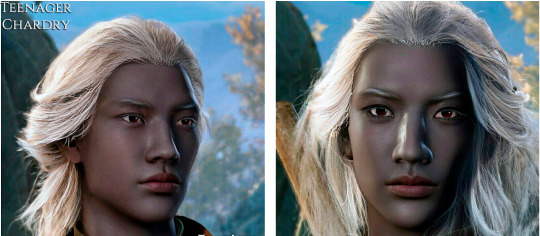
Chardry’s teenage was the most stressful time for her. He was unstable as any human teenager, but unlike those, he was too solitary and desperate to fit in. She never knew when Chardry would appear bleeding or severely hurt because he tried something he read in some books to look less drow.
The situation escalated so much that one day, when she returned to her caravan after a long day of business, she found him with his cheeks and white hair soaked in blood, crying out of frustration. He had mutilated his own ears. Months later, another similar episode happened, with his arms being burnt in acid, in an attempt to decolour the purple of his skin. Despite all her love—and her mistakes—she knew there were levels in which she could never reach her drow son. The young man was not a human even though she raised him as such in order to guarantee his better integration on the surface.
She tried to find a partner all her life, but the few opportunities in which her nomad lifestyle allowed her to find a girlfriend who would accept her constant movement across Faerûn, they disappeared as soon as they saw her drow child. Her partners advised her to leave the drow before Lolth would call upon him, and some even gave her ultimatums to choose between them or her son. She even forced herself to try to find a drow partner, but the few ones she met on the surface were so cruel that she left them soon afterwards. Her hopes in finding a drow parent to help her son to live on the surface were immediately discarded. In an attempt to get close to any drow that could help her son to better fit in, she tried to make contact with seldarin drows, but she never succeeded: they were rare to find and usually isolated, living far away from troubles.
When Chardry was finally an adult, he worked inside the caravan: cataloguing new books, developing business strategies [in which he was not skilful], and keeping the business accounting, while she remained the face of their business. Their relationship became deeper and stronger. Even though she knew that her son felt a heavy weight on his shoulders for all the complications she got in her life due to his presence, she always made him clear that she regretted nothing.
Later in her life, when she reached old age, she started to worry for her son’s future loneliness and his dire complications to establish relationships that could sustain him in his long life. In secret, she prayed to many gods to take care of her son’s lonesome fate.
------
Chardry’s main biography [here]
Fic while Early Access lasts [The Warmth Found by the Campfire]
[ Alessa’s photos are the result of bg3 character creator and artbreeder, playing with the many free filters of FaceApp. Chardry’s, only the FaceApp filters ]
4 notes
·
View notes
Note
Hello fellow Doctor Who fan. You've made it very clear that no one can be brainwashed or conditioned into following orders and being a killer. But this is exactly what was done to River Song. Was the entire storyline nonsense and poorly done? Or is the fact she got out of it means it didn't work? Maybe what sort of fixes would need to happen to as to not completely change the entire character? I am not asking for any particular story, but upbringing certainly shapes a character.
I’m going to start this off by saying that I’m not here to tell people what they should or shouldn’t like. There is nothing wrong with liking or not liking a character, story arc, plot etc. A lot of the pieces I’ve given low scores in the Torture in Fiction series are things I like and several of the things I’ve given high scores are things I don’t like.
What I’m trying to encourage is critical thinking and a greater level of understanding for the reality of torture.
So whatever I say about River Song, or any other fictional character, is just an opinion. There’s nothing wrong with enjoying something that has flaws and the flaws in something do not mean it has no worth. Plenty of stories handle torture badly but handle other difficult topics excellently.
The Torture in Fiction series is just about trying to get authors and audiences to think about how the media they love treats torture.
Now I’ve said all that, it’s been a while since I watched all of River’s episodes. I’m going from memory here and those memories may be wrong.
I don’t think we actually see enough of River’s childhood to say whether this is supposed to be the kind of brainwashing tropes I rail against or coercion.
There are a lot of deliberate gaps in River’s story. I think that’s a good thing because it helps give a sense that this is a character who does a lot of things away from the other characters. She has her own adventures.
But it also means that the writers are relying on the audience to fill things in.
She’s taken from her parents as a baby and raised to kill the Doctor.
Now that, in and of itself, does not necessarily suggest a brainwashing plot. Plenty of people in the real world are raised in isolated communities with the consistent message that they need to do or achieve something their parental figures decide for them.
We see organised attempts on the Doctor’s life by River and the group who raised her. But I don’t remember seeing anything from River’s life with this group beyond the moment when she’s taken as a newborn.
And that’s really the crux of the question: what were the details of her training and her childhood?
I don’t think we can accuse writers of torture apologia on the basis of something they never actually wrote. I also don’t think it’s good practice to leave such a glaring gap in this particular case. There are narratives where leaving this kind of gap means you should expect that a portion of the audience will fill in the gap with torture apologia. Because those are the tropes they’re used to.
From your perspective though, that gap means there isn’t necessarily much to ‘fix’. You can just decide to fill in the gap in with something that isn’t the standard ‘fanon’. Treating this as if River is raised by a cult (which arguably she is) and isn’t physically abused could work.
An upbringing by manipulative individuals could explain what we see of River’s behaviour; her obsession with the Doctor and her attempts early in her life to kill him.
There isn’t any guaranteed way to ‘make’ a person change their mind or think the way you want them too. But the key word there is ‘guaranteed’, manipulative and emotionally abusive tactics can effect someone’s beliefs, especially when the character in question is a child.
The people who raise River keep her isolated from the rest of the world, they control the information she has access to early on and they have the ability to use emotional responses and repetition to hammer their message home.
We know that from an early age River was taught an insane amount about the Doctor. He was made the focus of her upbringing. It’s not a stretch to imagine that she was praised and rewarded for remembering things about him, focusing on him or deducing/predicting his actions. In those circumstances her life long obsession doesn’t look that strange.
When we’re taught that something is that important, that central, consistently from a young age- Then yes for a lot of people it does become a central part of their lives. It’s bizarre that the focus is a person but if the focus had been a religious group or a political organisation it probably wouldn’t look quite as weird.
River’s also taught that the Doctor needs to die. I don’t think it’s much of a stretch to imagine that she’s taught she’s special and loved because she can kill him.
And I suppose we can argue that the people who take River and raise her are successful to some degree since River tries to kill him.
That’s more likely if River herself cares for the people who raised her and sees them as good parents. Physical abuse gets in the way of that.
And if I was writing River’s backstory that’s how I’d do it. I’d write her as isolated from the world outside the organisation and showered with love and praise because she’s going to kill the Doctor.
I’d create an environment where this child is taught that her worth and whether others love her is dependant on her performing this task.
Since River eventually leaves I’d probably also include punishments for questioning her teachers or going against what the organisation is trying to instil. These wouldn’t be physical punishments but things like trying to humiliate her, no play time or just having a trusted parental figure sit with her for hours going over how she’s wrong.
That kind of upbringing is likely to result in a child that’s willing to do all kinds of awful things. Because they’ve been taught it’s right and because they believe it’s the only way to ensure they’re loved.
It’s about trying to please the people they care about most in the world. And about those people callously using that love and affection to achieve their own aims.
There’s an ask here that you might find helpful. Looking through the tags for ‘cults’, ‘leaving cults’ and ‘child soldier’s’ will probably also be useful. I know there’s an old ask on how to write the ‘children raised to be assassins’ premise but I can’t find it at the moment.
I hope that helps. :)
Available on Wordpress.
Disclaimer
#writing advice#tw torture#tw child abuse#tw child soldiers#tw child abduction#emotional abuse#child soldiers#torture in fiction#manipulation#coercion#mental health#sci fi ask#doctor who
30 notes
·
View notes
Text
Documentaries : The 93rd Academy Awards (2020 Nominees)

As we get down to the nitty gritty on the Oscar preperation, I find myself down to the Best Documentary Feature, Best International Feature, Best Animated Feature and Best Song categories for watching (and listening respectively), as well as a few Best Picture nominees and a Best Visual Effects nominee. After seeing that Collective had gained placement on Hulu over the weekend, it felt fitting to address the Best Documentary Feature category and get that checked off of the list.

Collective (Hulu, dir. Alexander Nanau)

The deadly fire that ravaged the Collectiv nightclub on October 30 of 2015 was already a tragedy, claiming the lives of 26 people at the Bucharest location immediately. What was even sadder was what the wake of this fire exposed… a vast number of patients were taken to locations were they immediately gained infections via bacteria and contamination, only to be transferred and distributed amongst doctors in Bucharest who were not fit to treat burn victims or infection victims. Perhaps out of fear, incompetence, shame or some combination of the three, many victims were denied transfer to facilities that could suit them, and in the end, an additional 38 people died, bringing the ultimate toll to 64. Rather than implement interview footage, fancy infographics and recreated vignettes, Alexander Nanau approaches the tragedy with the utmost respect, allowing the victims, families of the victims and those representing them in various capacities be the focus of the story while letting their actions speak louder than any words directly addressed to a camera. We watch an investigation unfold in the hopes that it can open the door towards moving forward in the grieving process, not to mention eliminating the elements that led to the tragedy at hand, and much like a jury, we are left to make up our own minds where we stand in the matter. Perhaps it is this hands off approach that makes it so strong and immersive, sometimes to the point that one forgets they are simply viewing a documentary and instead feeling as if we are in the eye of a very personal and painful storm.

Crip Camp (Netflix, dr. James Lebrecht, Nicole Newnham)

The 1960s were a time focused heavily on breaking down social norms that thrived on exclusion, but usually, recollections of the era tend to focus on the struggles of minorities and women. Those who live with disability tend to lead a life of struggle as well, as many aspects of society are not geared towards accessibility and usability for all. Crip Camp not only shines a light on efforts during the 1960s that helped shift society at large away from practices of institutionalization and isolation for those with disability, but it serves as another realm of the nostalgia-filled spectrum for the time of hippies, free-love and revolution. Through archival footage, the story of the campers and counselors of Camp Jened is presented through their voices and actions, and the education (and personal validation) gained from the experience lead to further involvement in political and cultural moments that forced the Federal Government to make sweeping changes legislatively and infrastructurally. If nothing else, the involvement of President Barack Obama and Michelle Obama (as Executive Producers) helps to validate the messages of humanitarianism and understanding espoused in the documentary, not to mention it may help this documentary garner an Oscar.

The Mole Agent (Hulu, dir. Maite Alberdi)

Of all the films in the Best Documentary Feature category, The Mole Agent is the film that does the most in terms of blurring the line between documentary and narrative feature. If not for the occasional peek behind the camera (or the breaking of the fourth wall), one could easily misinterpret this film as a mockumentary or a staged documentary. There is also a built-in expectation that the film will go into the exploitation and mistreatment of patients in a nursing home, but really, what we get are very candid confessions and observations from those who occupy the homes... we get their opinions on their current living situations, the times changing around them, reminisces on loved ones and much more. Sergio is perfect as the center of the documentary, with his laid back and easy-going demeanor offsetting the spy-like nature of his mission, and his inquisitive and kind tendencies ingratiating him with the women of the nursing home. The espionage aspects of the film present wonderful opportunities for comedy, as do the very hardline defined stances, opinions and outlooks of the women.

My Octopus Teacher (Netflix, dir. James Reed, Pippa Ehrlich)
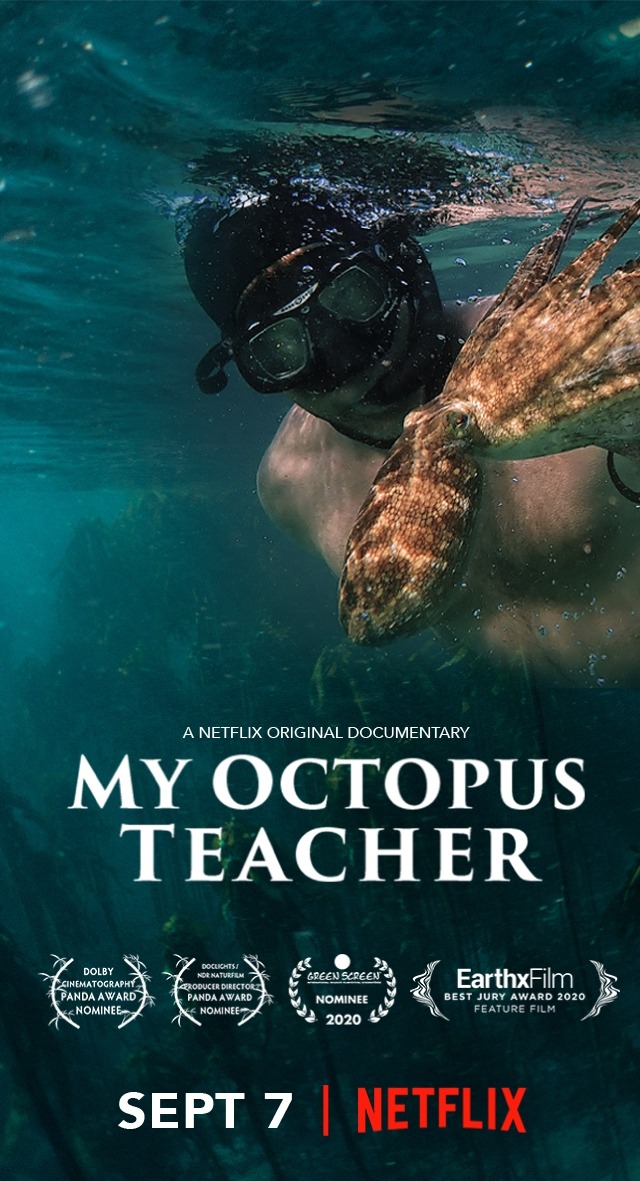
For the most part, human understanding and the vast spectrum of animal understanding have existed on opposite ends of a spectrum, with observations and learned behavior on both sides that has arisen out of past interactions. It’s very easy to just except the one or two base tenants we learn in our youth as a comprehensive breakdown of animalistic behavior, but My Octopus Teacher calmly and respectfully shows just how expressive, understanding and didactic that these animals can be when in their own environment and not influenced by human interaction. In the case of Craig Foster and the team behind My Octopus Teacher, we are presented with the richness of these interactions in a manner that resembles the connection that grows between a pet and an owner, but amazingly, it seems as if both Foster and the octopus that the documentary focuses on have no interest in a power or ownership dynamic. Watching trust grow between two forms that share little to nothing in terms of genetic makeup is captivating, and with Foster providing so much insight about his half of the experience, it really makes you wonder what it would be like if the octopus were able to voice her side of the experience. While the film chiefly centers around a man trying to understand an octopus in order to form a bond with it, the subtext seems to present us with an analogy about understanding people (and experiences) that may initially seem foreign to us, as well as showing how these efforts can create new and unbreakable bonds. Think of My Octopus Teacher as a visual illustration of a Venn diagram about the intersection between two different creatures’ respective circles of life.

Time (Amazon Prime, dir. Garrett Bradley)
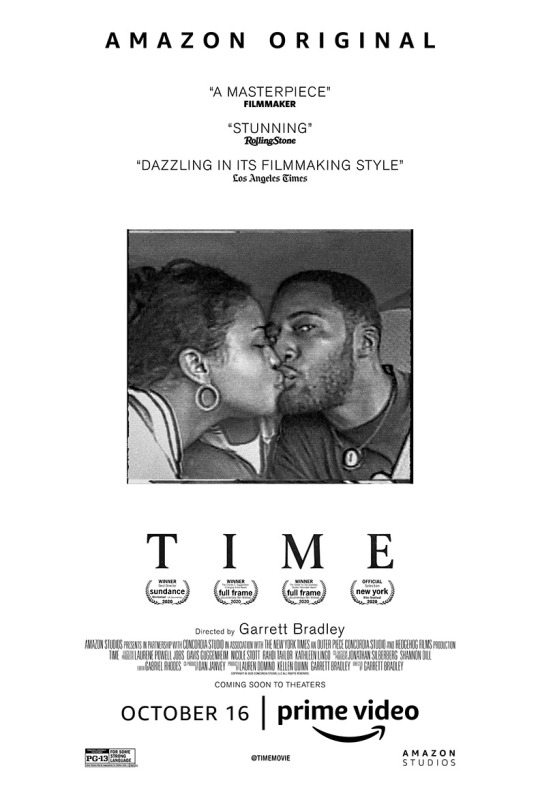
With the prison pipeline having such a devastating impact on communities throughout the United States, the importance of a documentary like Time cannot be understated. Mostly through the lens of home video, we are shown how the removal of a parent due to incarceration can have lasting impacts on the remaining family unit forced to cope with and adjust life in light of the incarceration. These candid videos give us a view into the life of Shreveport, Louisiana residents Rob and Sibil Fox Richardson, the fallout of the crime Rob and Sibil took part in, Sibil Fox’s attempts to redeem her family and reconcile the past, and all the while, her struggle to raise her six children and get Rob free. While most documentaries of this nature focus on injustices that lead to incarceration, Time opts to talk about the unbalanced nature of punishment in regard to the crimes committed (not to mention the factors that led to crime being seemingly the only option left). While incarceration is a key element to this documentary, what it really champions is the power of family and community, and how important it is for them to band together in times of struggle. Everyone in the film is completely honest and open, and no attempts are made to portray participants as angels or absence of faults, and due to this honesty, the experience of taking in the documentary is enhanced. On a technical level, the black and white presentation not only helps blend the home video footage with original footage much more seamlessly, but it also keeps the project from being dated, which speaks on the timeless nature of issues similar to these.
#ChiefDoomsday#DOOMonFILM#Oscars#AcademyAwards#BestDocumentaryFeature#Collective#CripCamp#TheMoleAgent#MyOctopusTeacher#Time
1 note
·
View note
Note
Hey, I’ve been reading a lot of your BNHA metas, (they’re all absolutely awesome btw) and I was wondering about two things, what kind of mental illness do you think Shigaraki has? And I read a post somewhere that speculated that he might have suffered a tbi when his father hit him with the tree sheers, do you think that might be true?
Hello anon, thank you for your ask!
I will try to answer your questions the best I can, however beforehand I think it’s important to note that I don’t really like diagnosing characters outside of like specific examples where the authors tell us this is the disease they were attempting to portray, or headcanons. Shigaraki clearly shows signs of mental illness, but I don’t think Horikoshi writes characters by looking up a list of symptoms in the DSM and then writing them based on that.
Also yes, the two clearest examples of mental Illness (Shigaraki, Twice) are both villains but I have faith that the mental illness of Shigaraki is an instance where it’s used to humanize him and show how much of a victim of a system both characters are, rather than just to give the villain traits that are abnormal and therefore creepy and dangerous.
I can’t give you a specific dianogisis but I can give you a more in depth look at several symptoms that Shigaraki displays.
Excoriation

Excoriation disorder is an obsessive-compulsive spectrum mental disorder that is characterized by the repeated urge or impulse to pick at one’s own skin to the extent that either psychological or physical damage is caused. In Shigaraki’s case it’s clearly a stress response that is aggravated the more violent, unstable or dangerous a situation he is put into.
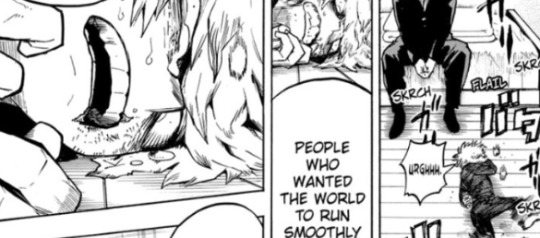
Which is why I find claims that Shigaraki is content with violence, or likes being a killer and is comfortable living this way to be false. Because Shigaraki’s own body constantly rejects him. He feels a compuslive need to scratch and harm himself because his body cannot handle the stress of being violent. It’s a stress response because Shigaraki does not actually on some level want to be doing these things, and living in a constant state of stress and harm makes him more compelled to vent his stress by following his compulsions.
The compulsion he feels can sometimes get so bad that in childhood he was rolling around the floor, crying and frantically scratching his whole body. This is not what All for One said and him holding back his urge to kill, but rather Shigaraki responding to the stress. Shigaraki is seven and was put in front of two homeless people who were threatening to harm him and he already came from a physically abusive household. He’s in unbelievable stress with no healthy way of venting it, and thereofre he compulsively self harms.
GAME TALK
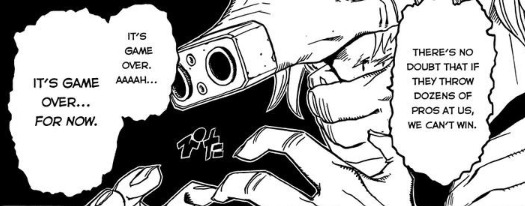
In general Shigaraki uses a lot of game talk. This is not so much a symptom of mental illness necessarily as it is a coping mechanism, but the goal is for Shigaraki to distance himself from reality. Basically it’s a mechanism for rgaining control because if you imagine life as just one big game where you are the player, you feel much more in control then some random kid who lost his family in a freak accident then got picked up by a super villain. Gamespeak is also a way of being deeply impersonal with the situation, in case it goes bad Shigaraki can say it’s just game over. It’s a layer of distance between him and reality, like I said, escapism to cope. His insistence of using game terminology for everything could also be seen as a “special interest” but once again that depends on your intepretation Shigaraki shows a whole cluster of symptoms that overlap with a lot of things.
HIGH ATTENTION TO DETAIL
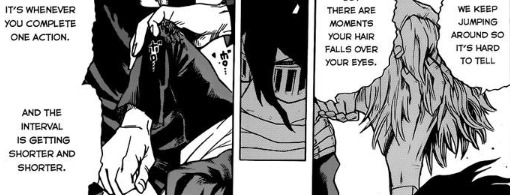
Shigaraki in a fight where he and AIzawa are jumping around trying to kill each other, Shigaraki is able to notice a detail as minute as when the hair falls over Aizawa’s eyes it stops, and also that his quirk was weakening because the tiny seconds long windows were getting shorter and shorter.
This is an extremely small detail to notice. Hyper-sensitizing, or hyper-attention to detail is another sign of mental illness, because usually the brain filters out superfluous details like this because otherwise noticing everything in that fine detail would overwhelm the senses.
Immaturity
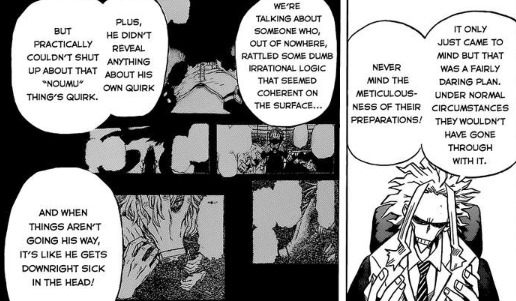

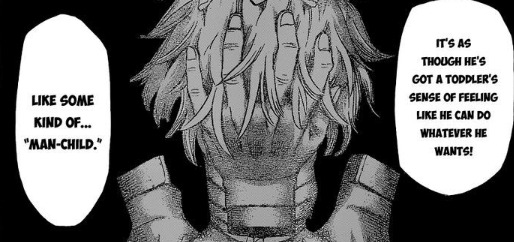
Shigaraki is completely unable to handle his negative emotions like a well-rounded adult. Though, I dislike how All Might and the others phrase it in this discussion because it is a pretty ablist description (downright sick in the head, a toddler’s sense of feeling like he can do whatever he wants). (the ablist part is that they’re using symptoms of his clear mental illness to dehumanize him.)
Regardless, Shigaraki of course does act like a man child, constantly talking about games, giving up easily, not having the patience to converse with others especially in situations he does not want to be in, throwing tantrums.
Children who are abused and neglected especially to the extreme extent that Shigaraki has, show long term developmental (that is term for the process of growing into a full adult) and behavioral problems. To the point where some studies have shown even the brain’s chemistry is permanently effected and the brain grows differently.
Children need a stable environment, and also positive role models for what adults act like to grow into full fledged adults, Shigaraki had neither of those. In fact he was also raised almost entirely outside of society except for the first five years of his life, so there is also no outside influence on his upbringing as well, which is why he is like a child, egocentric, unable to handle his emotions, because mentally he was never given the chance to develop past one.
ISOLATION

This is something that Shigaraki showed at the start of the series, but also has shown to develop past. At first he never left his room and from the several trash bags it’s quite obvious he spent long periods of time in there without taking care of himself or the environment around him in any significant way.
Shigaraki is no longer isolating as a result of having gotten closer to the league, he is basically available to them at all times and does not shut them off in any significant way. Which in this quick tangent we can also talk about symptoms Shigaraki does not have. Shigaraki is able to read a room pretty clearly, and knows how to hide himself in a crowd enough to keep Deku hostage with no trouble at all, and even leave the scene with Uraraka there without provoking her into attacking him or tipping her off what he was doing right away. Shigaraki is fairly competent at reading other people and he does have social skills so he’s not like someone who never sees the light of day or cannot interact with others and is clueless on how people think.
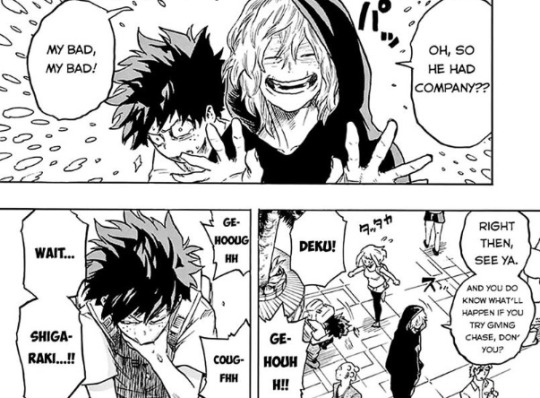
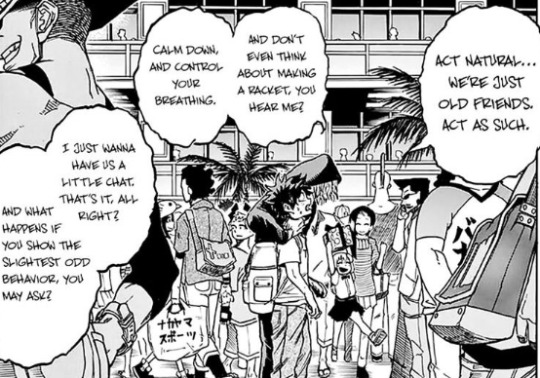
He’s also shown to be capable of making emotional connections with other people, and also of being considerate to those people’s needs. Which also shows that Shigaraki is capable of communication and also has an awareness of the feelings of other people and the ability to empathize, he is just choosy about who he makes connections with. He is definitely not someone unable to form an emotional connection with another person.
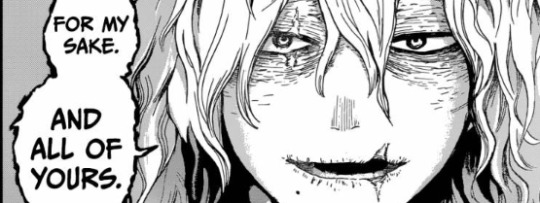
Shigaraki also shows a pretty flagrant disregard for all social norms, but that can be a result of being raised outside of society all of his life.
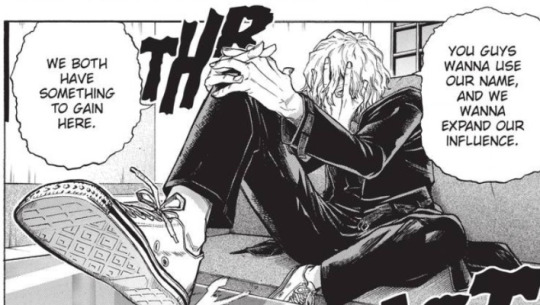
Shigaraki also likes to piss people off on purpose, almost like he is testing their boundaries and what he can get away with the same way a child playing around might.

Dissociation
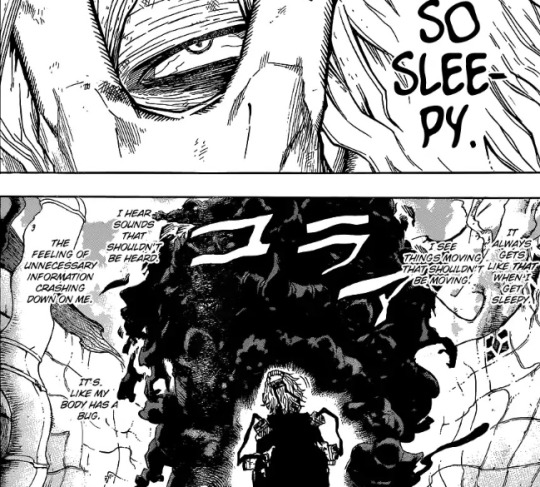
We have seen Shigaraki experience Dissociation in both senses of the word. First we have seen him physically detach himself from his feelings, and his own body in the middle of a fight and still continue on in a fugue-like state.
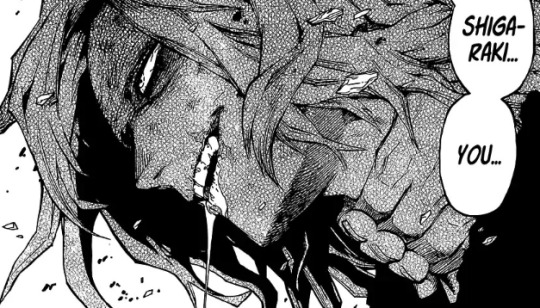
He experiences dissociation in the sense of the word meaning periods of detachment to your body, drifting away from your consciousness, severe feelings of alienation from himself, extreme difficulty concentrating or holding focus to the moment, his perception of both time and the area around him slipping to levels that are borderline hallucinogenic.
Dissociation is a mental process where a person disconnects from their thoughts, feelings, memories or sense of identity.
Shigaraki also displays traits of what is more classicly known as Dissasociative identity disord. He has two names, and clearly considers the life of Shimura Tenko to be separate from Shigaraki Tomura for a long time at the start of the manga. It might not be full on DID, but he at least dissociated his memories away from himself long enough that he forgot all of them like those memories belonged to another person, not Shigaraki but rather Tenko.
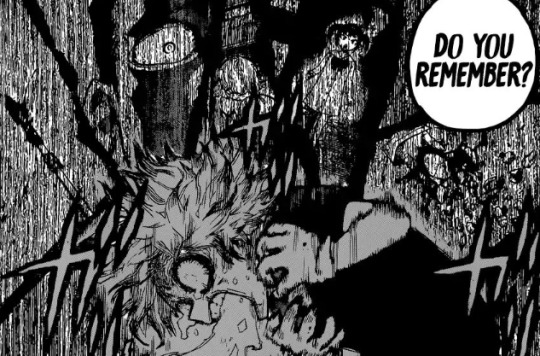

Shigaraki also foils Twice pretty heavily who developed actual dissociatve identity disord. He even shares similiar symptoms of speaking to himself when he speaks to the hand of “father”. I am not saying he has full on DID like I said I’m not diagnoising just that he displays several symptoms of it. He also came from an abusive household at an incredibly young age, which is where DID most commonly manifests.
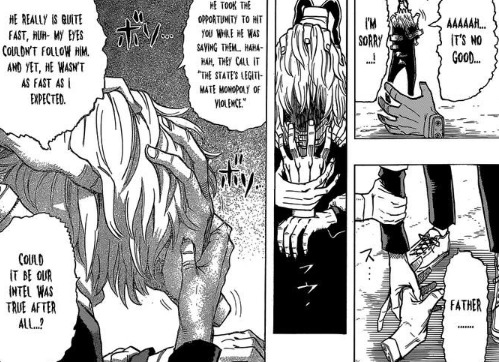
Shigaraki also shows signs of flashbacks when his memories return at inconvenient times during fights when direclty exposed to violence, or he experiences a trigger reminding him of his past. Flashbacks are a symptom that have the most in common with Post Traumatic Stress Disorder.
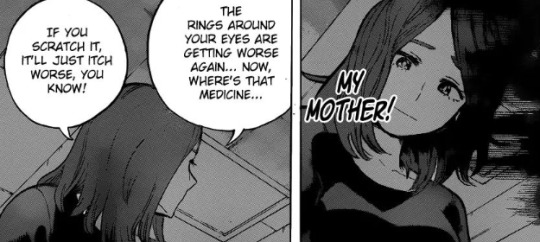
To answer your question on whether Shigaraki has a brain injury from when his father hit him with shears, there is evnidence suggesting he could have suffered brain damage, especially in the symptoms that he shares with Twice. However, at the same time Shigaraki also would have developed brain damage either way. Post Traumatic Stress Disorder is something that permanently rewires the brain after exposure to trauma. His brain has suffered a traumatic injury regardless of whether or not it was the garden sheers that did him in.
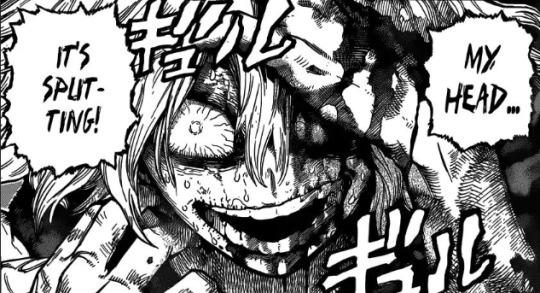
Suicidal Ideation / Self Harm

Shigaraki in general wishes to not exist, or to destroy everything so it will not exist anymore. Even if it’s not a direct wish for suicide that symptom is called suicidal ideation. It’s intrusive and persistent thoughts of suicide. The likely cause is once again, Shigaraki is absolutely not comfortable living like this, and is constantly overwhelmed with stress and pain and is seeking an escape.
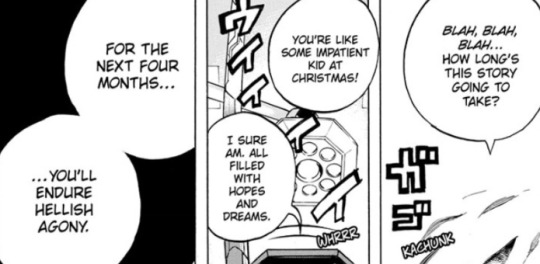
Shigaraki also actively seeks out harm. The same way he obsessively compulsively scratches, he puts himself into harmful situations like the extremely painful hellish surgery the doctor said he did not even have to endure if he did not want to. He feels compelled to harm himself, even when he is not fighting against someone else. He inflicts harm on himself becauseit is once again an unhealthy way to process his emotions. Oncce again all of these symptoms are there not to make Shigaraki out to be terrifying and incomprehensible because he is mentally ill, but rather to show he is a human being caught within the cycle of abuse with extremely unhealthy methods of coping with that fact.
#Anonymous#metasks#shigaraki tomura#mha meta#shigaraki meta#my hero academia#shimura tenko#tomura shigaraki
246 notes
·
View notes
Photo

14th February >> Fr. Martin’s Gospel Reflections / Homilies on Mark 1:40-45 for the Sixth Sunday in Ordinary Time, cycle B: ‘Jesus stretched out his hand and touched him’.
Sixth Sunday in Ordinary Time, Cycle B
Gospel (Except USA)
Mark 1:40-45
The leprosy left the man at once, and he was cured
A leper came to Jesus and pleaded on his knees: ‘If you want to’ he said ‘you can cure me.’ Feeling sorry for him, Jesus stretched out his hand and touched him. ‘Of course I want to!’ he said. ‘Be cured!’ And the leprosy left him at once and he was cured. Jesus immediately sent him away and sternly ordered him, ‘Mind you say nothing to anyone, but go and show yourself to the priest, and make the offering for your healing prescribed by Moses as evidence of your recovery.’ The man went away, but then started talking about it freely and telling the story everywhere, so that Jesus could no longer go openly into any town, but had to stay outside in places where nobody lived. Even so, people from all around would come to him.
Gospel (USA)
Mark 1:40–45
The leprosy left him, and he was made clean.
A leper came to Jesus and kneeling down begged him and said, “If you wish, you can make me clean.” Moved with pity, he stretched out his hand, touched him, and said to him, “I do will it. Be made clean.” The leprosy left him immediately, and he was made clean. Then, warning him sternly, he dismissed him at once.
He said to him, “See that you tell no one anything, but go, show yourself to the priest and offer for your cleansing what Moses prescribed; that will be proof for them.”
The man went away and began to publicize the whole matter. He spread the report abroad so that it was impossible for Jesus to enter a town openly. He remained outside in deserted places, and people kept coming to him from everywhere.
Reflections (5)
(i) Sixth Sunday in Ordinary Time
One of the more distressing impacts of the Coronavirus for many people has been the experience of social isolation. People in nursing homes and hospitals in recent months have felt especially isolated. I have a friend, a woman in her nineties, who was in hospital for several months before and after Christmas and, for perfectly understandable reasons, no one could visit her. I am sure that many others in the parish have had a similar experience with their loved ones or friends in hospital or nursing homes. Hopefully, we can begin to look forward to a time when we can interact with one another in a more natural and human way.
In the time of Jesus, leprosy was the most isolating of all diseases. In the words of today’s first reading, the leper had to live ‘outside the camp’, away from the normal places where people interact. If for some reason, the leper drew near to people, the Jewish law stipulated that they had to announce their coming, shouting, ‘Unclean, unclean’, so people could move away from them as quickly as possible. Not only were lepers socially isolated, but they were religiously isolated. They couldn’t come to the local synagogue to join in the Sabbath service. What we find the leper doing in today’s gospel reading then is all the more remarkable. He breaks out of his isolation to approach Jesus, going against the stipulations of the religious law of the time. Why did he so something so unconventional? Presumably, he had heard of the reputation of Jesus as one who proclaimed God’s rule of love by healing the sick and welcoming the excluded. The words of the leper to Jesus show that he was in no doubt as to Jesus’ power to heal him, ‘you can cure me’. Yet, he wasn’t sure that Jesus wanted to heal him, ‘If you want to, you can cure me’. When people have been living in isolation for a long time, they can begin to doubt whether people really want to connect with them. They may begin to wonder if anyone out there really cares enough to lessen their isolation.
If the leper had approached others as he approached Jesus, they would have promptly moved away. However, the leper suspected that Jesus might be different. Here is someone, he hoped, whose ways are not our ways. How did Jesus react to the leper? The emotion ascribed to Jesus in the gospel reading suggests a deeply rooted, gut wrenching, reaction to the leper, a mixture of anger and compassion, anger at what this disease had done to the quality of this man’s life, and a compassionate desire to change his situation for the better. This deep seated, emotional, response to the man finds expression in the words Jesus spoke to him, ‘Of course I want to. Be cured!’ It would have been enough for Jesus to say, ‘Be cured!’ for the man to be healed. In the gospels, Jesus frequently heals people with his authoritative word. However, on this occasion, Jesus does the unthinkable. Having spoken to the leper, he then touched him. Once Jesus touched him, the leper must have realized that he was being released from his isolation. We might wonder how long it had been since the leper had felt the touch of another human being. A certain understanding of God’s law had excluded him from the community of the living and left him on the threshold of a kind of death. However, by that touch, Jesus was revealing that this is not what God wanted for him. The touch of Jesus was the touch of God. Jesus reveals a God who does not exclude anyone. Jesus shows that in the heart of God there is room for everyone, especially for those who have been made to feel that they do not belong. Sometimes our religious laws and institutions exclude people, but Jesus reveals a God who wants to touch the lives of all in a healing and life-giving way. Jesus’ whole ministry displays God to be one who works to demolish the boundaries that seek to keep some people safe at the expense of leaving others out in the cold.
Leprosy is not the frightening disease today that it was in the time of Jesus, as it can be treated and cured. Yet, in every age, society has a tendency to decide who is acceptable and who is out of favour. We continue to relegate some people to the side-lines for a whole variety of reasons, perhaps because we seem them as a threat to us or as a burden on us or just because they are different from us. I am often struck by that saying of Jesus in John’s gospel, ‘When I am lifted up from the earth, I will draw all people to myself’. Having been lifted up on the cross and lifted up in glory, the risen Lord continues his work of drawing all people to himself today. The gospel reading today raises the question of what Jesus wants. I think we can say with certainty that today the risen Lord wants to work through each one of us to rescue people from their sense of isolation. He wants the miracle of today’s gospel reading to become a contemporary reality, through our willingness to befriend those who are isolated or who find themselves on the margins of acceptablity for whatever reason.
And/Or
(ii) Sixth Sunday in Ordinary Time
People who feel isolated appreciate it when someone enters their isolation and tries to connect with them. There are various reasons why people can find themselves isolated. Old age and failing health can make it difficult for people to make the kind of contact with others they deeply desire. That is especially the case if people are house bound. The radio link we have in the parish is one attempt to make contact with people who find it difficult to make contact with us. There is a certain kind of temperament that can leave people somewhat isolated. The shy, retiring, introspective person who finds it difficult to make friends can become very isolated over time. It can be a struggle for others to connect with them. To be a stranger in a land or an environment that is foreign to us can also be a very isolating experience. I’m sure some of our recent immigrants would speak to us of an initial sense of isolation. Any one of us can experience a sense of isolation from time to time. I remember my first weekend in the seminary at the age of 18. It was my first time away from home for any length. The sense of isolation was overwhelming, although it did pass. We may feel isolated even though we are surrounded by people, friends and family. We can be struggling with personal issues that we find very difficult to share with others, even those who are closest to us. In such a situation it can be a great relief to meet someone who is struggling with similar issues.
In the time of Jesus the disease of leprosy left a person totally isolated. If you were a leper, there was no one for company but other lepers. The community needed to protect itself from a highly contagious disease, and the only effective way to do this was to isolate the leper from all forms of human interaction. In that context, the action of Jesus in touching the leper in today’s gospel reading would have been considered subversive. His touching the leper was putting the whole community at risk. A chain is as strong as its weakest link. Here was a weak link, someone who risked the health of the whole community by touching an infected person. If you watch the TV programme you know what happens to the weakest link. They are banished into the darkness; they are treated like lepers. Yet, in touching the leper, Jesus did not in fact infect the community. He healed the leper and, thereby, strengthened the community. In responding to the cry of the leper and in reaching into his isolation, Jesus released him into the community again. Having healed the leper, we are told that Jesus had to stay outside in places where nobody lived. His touching the leper cost him something; he took upon himself something of the leper’s isolation. This kind of ministry would eventually lead Jesus to become totally isolated. He would be crucified ‘outside’ the city where nobody lived, where he would die isolated and alone.
The gospel reading reveals Jesus as someone who desires to enter into our isolation, who seeks to release us from our isolation, even at the cost of experiencing great isolation himself. He continues to enter our experiences of isolation today if, like the leper, we invite him. In the gospel of John Jesus says, ‘Anyone who comes to me, I will never drive away’. When the leper came to Jesus, he half expected to be driven away. This explains his rather tentative request, ‘if you are willing…’ In reply Jesus said, ‘Of course I am willing’. We can be equally tentative in our own approach to the Lord. Like the leper, we may feel unclean in some way. Something in our lives, in our past or in our present, can make us hesitate to draw near to the Lord. We may wonder if the Lord is willing to draw near to us. Yet, there is no part of our lives which the Lord will not gladly touch with his compassionate and life-giving presence. There is nothing in us that would keep him from us. He does not hesitate to touch, even to embrace, those parts of our lives we may consider ugly and infected. It is we who need to rise above our hesitation. The letter to the Hebrews puts it well when it encourages us, ‘Let us approach the throne of grace with confidence, so that we may receive mercy and find grace to help us in our time of need’.
The gospel reading encourages us to approach the Lord with the same assurance with which he approaches us. That reading also challenges us to be as alert to those who may be crying out to us in their isolation as Jesus was to the leper. That cry is not always easy to hear, even when it comes from those close to us. It can be subtle and faint. It can be hesitant, as it seeks out whether we are willing. Our own preoccupations can prevent us from hearing it, and can make us hesitate to respond. We may sense that it will cost us something to respond. Yet, to hear and respond can be truly life-giving for the one who cries out to us and for us. We ask the Lord to give us the willingness to heed the cry of those who cry out to us in their isolation.
And/Or
(iii) Sixth Sunday in Ordinary Time
We know from experience that we find it easier to connect with some people than with others. We find ourselves drawn to some individuals and being somewhat put off by others. We can react negatively to some people for a great variety of reasons. Maybe we just do not like the look of them, or we find their personality hard to take, or we have very little sympathy with their views. We probably tend to avoid the people that we find difficult to connect with. We keep them at a distance from us.
In the time of Jesus the leper was someone that no one wanted to connect with. Indeed, the Jewish law required that lepers be kept at a distance from everyone else. Leprosy was a disease that condemned those afflicted by it to a life in which their only company was other lepers. The disease was contagious and the community had to be preserved from infection. In today’s gospel reading the leper leaves his isolation and daringly approaches Jesus, calling out to him on his knees: ‘If you want to, you can cure me’. He was prepared to break the law that condemned him to isolation in order to make contact with Jesus. Clearly the leper did not doubt Jesus’ ability to heal him, ‘you can cure me’. His only doubt was whether Jesus wanted to cure him, ‘if you want to’. In response to the leper, Jesus did the unthinkable. He stretched out his hand and touched him, declaring as he did so, ‘Of course, I want to!’ The man could now return to the community from which he had been isolated. In connecting with the leper, Jesus enabled the leper to connect with everyone else. In touching him, he enabled the leper to touch others.
In touching the leper, Jesus reveals a God who wants to make contact with us in all our brokenness. Jesus was declaring that there is no human life that God cannot touch. Everyone kept a distance from the leper. In touching the leper, Jesus was declaring that God is not like everyone. We may keep our distance from God for various reasons, but God never keeps a distance from us. We may think that because of something we have done in the past, we cannot approach God with confidence. Jesus reveals that God is always ready to approach us, regardless of how we might see ourselves, or how others might see us. Jesus could have healed the leper without touching him. The gospel often depicts Jesus healing people with a word. Yet, in the case of the leper, word was not enough. Touching the leper was a much more tangible sign that God wanted to connect with this man. Jesus makes God tangible as well as audible.
God continues to be tangible as well as audible in the church, the body of the risen Jesus. There is more to the sacraments of the church than words. The sacraments are tangible; they reveal the God who wants to touch us. The water of baptism, the oil of confirmation, the bread and wine of the Eucharist are all tangible signs of God’s presence to us. God wants to touch our lives through his Son. If it does nothing else, the story of Jesus and the leper makes that abundantly clear. The only question is, ‘Do we want God to touch our lives?’ When it comes to God, do we have the passionate daring that the leper shows in today’s gospel reading?
Outside the context of family and close friends, we have to be careful with touch nowadays. In particular, many of us are much more hesitant to touch children than we might have been in the past. We know that touch can mean many things. It can be self-serving as well as serving of others. It can be harmful as well as helpful. In the culture of his time, Jesus seemed to be remarkably free when it came to touch. In last Sunday’s gospel reading, he took Simon Peter’s mother in law by the hand and lifted her up; later on in Mark’s gospel he takes Jairus’ daughter by the hand and he takes children up in his arms and lays his hands on them. We are hesitant when it comes to touch because we know of what we are made. Jesus had no need to be hesitant. His touch was always deeply respectful and completely life-giving. Jesus shows us a God who recognizes our infinite value and worth and relates to us accordingly. That is why in the words of the letter to the Hebrews, we can ‘approach the throne of grace with confidence, so that we may receive mercy and find grace to help us in our time of need’.
And/Or
(iv) Sixth Sunday in Ordinary Time
There are many places in Ireland that could be termed isolated. They are away from human habitation. They have their own attractiveness because of their isolation. People from the city like to head off to these isolated places to get away from the hustle and bustle of their normal routine. Many people will have their own favourite isolated spot that they keep returning to. It is not always necessary to travel long distances to find such an isolated spot. For those of us living here in Clontarf, parts of the bull island or of Saint Anne’s park can give us all the isolation we need to get a sense of being away from it all. This is the kind of isolation that we seek out; we look for it because we want it and we feel we need it. When we have had enough of it, we can return to our normal day to day routine with its various demands and schedules.
There are other forms of isolation which we don’t welcome and don’t seek out. When we experience this kind of isolation, we long for someone to enter our isolation and connect deeply with us. Old age can bring on this form of isolation for some. A person’s spouse may have died or they have always been single; family and friends may be very caught up with their own lives. If such a person moves from their home into a nursing home, their sense of isolation can be compounded. Certain forms of illness can bring on this kind of unwelcome and unsought for isolation at any age. People may not visit the person who is ill because they are not sure what to say to them, especially if that person is relatively young.
In the time of Jesus, the most isolating illness was certainly leprosy. The leper lived apart, with only other lepers for company. Lepers were not only distant from the human community, but they were also considered to be distant from God. That is why they were considered ‘unclean’, in the sense of being at the furthest possible remove from the holiness of God. Not only were they not permitted to approach people, but they were given no encouragement to approach God. That makes the portrayal of the leper in this morning’s gospel reading all the more striking. He approaches Jesus, in spite of the fact that the Jewish law forbade him to approach anyone. Here was a leper who was determined to break out of his isolation. We can only presume that he had come to hear of the healing ministry of Jesus, and that is why he approached him. The leper was in no doubt about Jesus’ power to heal him; his only doubt was whether or not Jesus wanted to heal him, ‘You can cure me, if you want to’. Did this man of God want to connect with someone who was ‘unclean’ and beyond the boundary of God’s reach? Jesus’ response to the leper’s statement was unambiguous, ‘Of course I want to. Be cured’. Jesus showed that he had not only the power to heal him but the desire to do so as well. Jesus wanted what God wanted; in the garden of Gethsemane he would pray, ‘not what I want, but what you want’.
In saying, ‘Of course I want to’, Jesus was revealing what God wanted. The leper was wrong to think that he was beyond God’s reach. Jesus reveals that there is no human condition - no human situation - that is beyond the reach of God. There is no ‘out of bounds’ as far as God is concerned; there is no need for anyone to live ‘outside the camp’ in the words of the first reading. There were many categories of people in the time of Jesus who had been led to believe that they were beyond the reach of God. Jesus revealed God to be someone who had no fear of contamination but was comfortable entering into the often murky depths of human existence.
The healing of the leper is the third healing story in Mark’s gospel. In the first healing story, Jesus healed a man by means of his word. Presumably, Jesus could have healed the leper just with a word, ‘Be cured’. Yet, Jesus chose to stretch out his hand and touch the leper. Such was the nature of this man’s isolation that more than a word was needed to show that his isolation was over. He needed to be touched, to be held. It was against the Jewish law to touch a leper, because of the risk of being contaminated and contaminating the whole community. However, Jesus knew that God’s power at work within him could never be contaminated by the human condition. The power of life, of God’s life, within Jesus was stronger that the power of death within the leper. Jesus reveals a God who wants to touch our lives in a life-giving way, regardless of how broken or ugly or hopeless our lives might seem to us or to others. The Lord not only speaks his word to us; he connects with each of us in ways that are concrete and personal.
And/Or
(v) Sixth Sunday in Ordinary Time
We all feel a need to connect with others, to be in communion with others. We don’t like to feel isolated or cut off from family, friends, or the wider community. One of the most challenging aspects of sickness or physical disability can be the isolation that it brings. When we are ill or our body grows weak we cannot take the same initiative we used to take to connect with others. People can become housebound because of their physical condition; the things they used to do to meet up with others are no longer possible. Certain forms of illness can be more isolating than others. The most isolating form of illness in the time of Jesus was leprosy. For hygienic reasons, lepers had to live apart, ‘outside the camp’, in the words of today’s first reading. Lepers were only allowed to have each other for company. They lived apart from their family, their friends and the community to which they belonged.
The leper in today’s gospel reading seemed determined to break out of his isolation. He did something that was unconventional and daring in approaching Jesus and pleading with him, ‘If you want to, you can cure me’. His desperation to be healed of an illness that kept him totally isolated drove him to do something that was against the Jewish Law at the time. In response to the leper’s daring approach, Jesus did something just as unconventional. He reached out his hand and touched the leper. If it was forbidden for a leper to approach the healthy, it was certainly forbidden for a healthy person to touch a leper. It seems that the leper’s desire to be freed from his isolation was met by an equally strong desire on the part of Jesus to deliver the leper from his isolation. The gospels portray Jesus as someone who worked to deliver people from their isolation, whether it is an isolation imposed by illness, as in the case of the leper, or by their lifestyle, as in the case of someone like Zacchaeus.
Both the person of Jesus and of the leper have something to say to us about steps we can take to connect with people, to break out of our isolation, even when the odds seem to be stacked against us. We can all be tempted from time to time to retreat into our shell, whether it is because of our health or some disability or some past experience that has drained us of life. It is at such times that we need something of the initiative and daring energy of the leper. There can come a time when, like the leper, we need to take our courage in our own hands and, against the conventional expectation, to head out in some bold direction. It was desperation that drove the leper to seek out Jesus. Sometimes for us too, it can be our desperation that finally gets us going, gets us to connect with that person who matters to us and to whom we matter more than we realize or that gets us to link up with some gathering or some group that has the potential to do us good or maybe even to transform our lives. Sometimes I can be amazed at the initiatives that some people take to connect with others, people who are much less healthier than I am and are much less physically able. I come across it all the time in the parish, such as older people who have mastered the internet and have come completely at home with Skype; younger people who in spite of some serious disability have found the means to live a very full life in the service of others. The man in today’s gospel reading who approaches Jesus could well be the patron saint of all those who strive to connect with others against all the odds.
Unlike the leper, Jesus was perfectly healthy, yet, like the leper, he had something of the same desire and energy to connect with others. When Jesus was approached by the leper, he could have run away, as most people would have done. Instead, he stood his ground and engaged with the leper. He engaged with him not only by word but by action. He not only spoke to the leper, but he touched him. Jesus often healed people by means of his word alone; but this man who had suffered from extreme isolation needed to be touched. Jesus did more than was asked of him; he took an initiative that was as daring as the leper’s initiative towards him. He went as far as any human being could possibly go to deliver this man from his isolation. What the Lord did for the leper he wishes to continue doing through each one of us today. There are many isolated and lonely people among us. The scope is there for all of us to take the kind of step that Jesus took towards the leper. Again, I can see examples of that in the parish all the time, such as people who look in on neighbours and make sure that they are all right and have what they need. There are always people among us waiting to be touched by our compassionate presence. When they are, they can experience the same kind of transformation as the leper did in today’s gospel reading.
Fr. Martin Hogan.
1 note
·
View note
Text
Interstellar travel could make human language evolve beyond recognition, study says
https://sciencespies.com/space/interstellar-travel-could-make-human-language-evolve-beyond-recognition-study-says/
Interstellar travel could make human language evolve beyond recognition, study says
It’s a captivating idea: build an interstellar ark, fill it with people, flora, and fauna of every kind, and set your course for a distant star! The concept is not only science fiction gold, its been the subject of many scientific studies and proposals.
By building a ship that can accommodate multiple generations of human beings (aka. a Generation Ship), humans could colonize the known Universe.
But of course, there are downsides to this imaginative proposal. During such a long voyage, multiple generations of people will be born and raised inside a closed environment. This could lead to all kinds of biological issues or mutations that we simply can’t foresee.
But according to a new study by a team of linguistics professors, there’s something else that will be subject to mutation during such a voyage – language itself!
This study, “Language Development During Interstellar Travel“, appeared in the April issue of Acta Futura, the journal of the European Space Agency’s Advanced Concepts Team.
The team consisted of Andrew McKenzie, an associate professor of linguistics at the University of Kansas; and Jeffrey Punske, an assistant professor of linguistics at Southern Illinois University.
In this study, McKenzie and Punske discuss how languages evolve over time whenever communities grow isolated from one another. This would certainly be the case in the event of a long interstellar voyage and/or as a result of interplanetary colonization.
Eventually, this could mean that the language of the colonists would be unintelligible to the people of Earth, should they meet up again later.
For those who took English at the senior or college level, the story of Caxton’s “eggys” ought to be a familiar one.
In the preface to his 1490 translation of Virgil’s Aeneid (Eneydos) into Middle English, he tells a story of a group of merchants who are traveling down the Thames toward Holland. Due to poor winds, they are forced to dock in the county of Kent, just 80 kilometres (50 miles) downriver and look for something to eat:
“And one of them named Sheffield, a merchant, came into a house and asked for meat and, specifically, he asked for eggs (“eggys”). And the good wife answered that she could speak no French. And the merchant got angry for he could not speak French either, but he wanted eggs and she could not understand him. And then at last another person said that he wanted ‘eyren’. Then the good woman said that she understood him well.”
This story illustrates how people in 15th century England could travel within the same country and experience a language barrier. Well, multiply that to 4.25 light-years to the nearest star system and you can begin to see how language could be a major complication when it comes to interstellar travel.
To illustrate, McKenzie and Punske use examples of different language families on Earth and how new languages emerged due to distance and time. They then extrapolated how this same process would occur over the course of 10 generations or more of interstellar/interplanetary travel.
As McKenzie explained in a UK press release:
“If you’re on this vessel for 10 generations, new concepts will emerge, new social issues will come up, and people will create ways of talking about them, and these will become the vocabulary particular to the ship. People on Earth might never know about these words, unless there’s a reason to tell them.
“And the further away you get, the less you’re going to talk to people back home. Generations pass, and there’s no one really back home to talk to. And there’s not much you want to tell them, because they’ll only find out years later, and then you’ll hear back from them years after that.”
An example they use is the case of Polynesian sailors who populated the South Pacific islands between 3,000 and 1,000 BCE.
Though the roots of these sailors are traced to Taiwan (ca. 6000 BCE) this process of expansion led to the development of entirely new cultures by the 1st millennium BCE. The Polynesian languages that emerged bore little resemblance to the ancient Austronesia language (aka. “Formosan”) of their ancestors.
Similarly, the authors cite language changes that take place within the same language community over time, using the example of “uptalk.” Also known as “High Rising Terminal,” this phenomenon involves statements ending with a rise in intonation.
While it is often mistaken for a question by those who are unfamiliar with it, the convention is actually intended to indicate politeness or inclusion.
As the authors note, “uptalk” has only been observed in the English language within the past 40 years and its origins are unclear. Nevertheless, the spread of it has been noted, particularly by members of the Baby Boomer generation that use it today, but did not in their youth.
Another issue they identify is sign language, which will require adaptation from the crew since some crewmembers will be born hearing impaired.
Without someone keeping track of changes and trying to maintain grammatical standards, linguistic divergence will be inevitable. But as they note, that might be irrelevant, since language on Earth is going to change during that same time.
“So they may well be communicating like we’d be using Latin – communicating with this version of the language nobody uses,” said McKenzie.
Last, but not least, they address what will happen when subsequent ships from Earth reach the colonized planets and meet the locals. Without some means of preparation (like communication with the colony before they reach it), new waves of immigrants will encounter a language barrier and could find themselves being discriminated against.
Because of this, they recommend that any future interplanetary or interstellar missions include linguists or people who are trained in what to expect – translation software ain’t gonna’ cut it!
They further recommend that additional studies of likely language changes aboard interstellar spacecraft be conducted, so people know what to expect in advance. Or as they conclude in their study:
“Given the certainty that these issues will arise in scenarios such as these, and the uncertainty of exactly how they will progress, we strongly suggest that any crew exhibit strong levels of metalinguistic training in addition to simply knowing the required languages. There will be need for an informed linguistic policy on board that can be maintained without referring back to Earth-based regulations.”
Just for fun, let’s see what kinds of linguistic changes could take place.
For starters, let’s assume that a generation ship does take a full ten generations to reach its destination – in this case, Proxima b. Ten more generations pass before the next ship arrives, bringing people from Earth who still speak modern English.
Using the language evolution-simulator Onset, and an English-IPA translator, we can get a small taste of how a simple English-language greeting, and a common request (if you’re in a 50s sci-fi B movie), would change over twenty generations:
“Helluhuh fret, goot tu’uh be’yat yu. Took be’ye to’o u’ul ley’eru, pley’yaz.”
As you can see “Hello friend, good to meet you. Take me to your leader, please” comes out a little different after twenty generations of separation.
How about something more complicated, but no less familiar? Here’s a famous speech that fans of space exploration and history should recognize. After twenty years of interstellar travel, here’s how that speech would sound:
“Wu’eh cho’oz to’o go to’o too Bo’od! Wu’eh cho’oz to’o go to’o too Bood id teez dey’ich udh do’oh tey’e de uttur teedgz, dot biga’ozz tey’e ar ey’ery’eh, boot biga’ozz tey’e ar hard; biga’ozz tat goal wool surve to’o olgoodiez uhd bez’hur too bezt oov uhur eluree’iaz uhd skeelz, uhd biga’ozz tat chaludi iz wuhd tat wu’e ahr wooleet to’oh igsept, wuhd wu’e ahr udu’illid to’o postbode, ohd wuhd wu’e iddet to’o wud.”
Can you guess what speech that is? Keep in mind, this is just a basic simulation of how the English language might change for a group of colonists, never mind people here on Earth.
And when you take time to consider all of the spoken language and dialects spoke today, and that any combination of these will be brought with the colonists to the stars, you can see how confounding it all could be!
There is a reason why the myth of the Tower of Babel remains embedded in our collective unconscious. Language barriers have always been a hurdle for human interaction, especially where long stretches of time and space are concerned.
So if humanity plans to “go interstellar” (or interplanetary), we’ll be taking that hurdle to a whole new level!
In the meantime, you can check out several other articles we’ve done on the subject of generations ships, how big they would have to be, and the minimum number of crew they would need.
This article was originally published by Universe Today. Read the original article.
#Space
6 notes
·
View notes
Text
The Girls Under the Floor and the Boy from Space: Isolated Upbringings and the Terror of Loss

There are many reasons why Plot this season has required Octavia to be outside of Sanctum, but one that seems to be overlooked is that if she *was* there, Plot wouldn’t be able to further alienate and break down her fellow isolates Madi and Jordan.
For four seasons, Octavia was unique in her circumstances - raised in isolation away from society, only ever knowing her mother and her brother for the first sixteen years of her life, until she was arrested and then later sent to the ground. We’ve followed her journey from reckless wild child to ruthless leader to fallen angel, without reflecting too much on how her early life impacted that journey.
Because it did, and still does, and we’re seeing the same mistakes that were made with Octavia’s integration into society repeated with Madi and Jordan, and if Octavia was there, she wouldn’t let it happen, because she’d recognize the signs that regularly-socialized people (that is, everyone else) can’t. She isn’t alone in her circumstances anymore.
We don’t know the full details of Madi’s early life, we don’t know whether Madi was completely isolated from her society or whether she was only hidden away when the Flamekeepers came calling, but this fear of discovery is something that plagued her early years in the same way it did Octavia’s. Then Praimfaya came, and Madi was completely alone for two months, and then only had Clarke for the next six years. Clarke wasn’t her mother, but just like Bellamy raised Octavia, Clarke raised Madi, and became the most important person to her - indeed the only person, until the chaos of season 5 descended.
Jordan was raised in a much calmer environment - he lived without the fear and terror of discovery by outside forces, but he still only knew two people for the first twenty-six years of his life - his parents. Then when people start waking up and he’s among others for the first time in his life, his only worth to them is through his connection to his parents - much like Octavia spent season 1 seen as no one beyond “Bellamy’s sister” - and thus when that doesn’t bring the community he was expecting, he goes looking for that human connection outside of that community with Delilah, someone who sees him as his own person and not his parents’ legacy (paralleling Octavia’s relationship with Lincoln).
There are many characteristics and psychological traumas associated with such an upbringing, no matter how kind and supportive the caregivers are, no matter how their integration into society takes place, because some problems can’t be loved away, no matter how much someone might think that they can be.
The chief among these - and the one that is most relevant for this post - is the high level of dependency that isolates in these circumstances have, either on their caregiver or, in the caregiver’s absence, the other person that they’ve imprinted on.
Octavia had both - her brother, Bellamy, and then her lover, Lincoln. Madi had her caregiver, Clarke. Jordan had his lover, Delilah.
And each of them had their Person violently torn away from them, and everyone around them was oblivious to just how psychologically damaging that is to someone who doesn’t know how to relate to the world outside of that Person.
Octavia verbalizes this for the first time in 6x11, when she tells Bellamy “You were my rock. Without you as my compass, I was lost." And this applies just as much to her fellow isolates and how they process loss.
When Madi loses Clarke,while the people around her are clearly sympathetic to her loss, they don’t understand the magnitude of such a loss. It isn’t just the loss of a parent - it is the loss of the only person she had for six years. Like Octavia, Madi has documented violent tendencies (let’s not forget that she and Clarke met when Madi led her into a bear trap and tried to stab her), and just a hug isn’t going to cut it. Nor will a simple statement of “no, we’re not stabbing people today”. She needed much more involved attention and care to help her control herself and be able to process the situation. Instead, everyone except for Sheidheda ignored her pain. Bellamy especially dropped the ball here, since he should have remembered what happened with Octavia after Lincoln’s death.
Then we have Jordan. First, everyone belittles the attachment that he formed with Delilah, thinking that he shouldn’t have gotten so invested so quickly, but since none of them had had any interest in getting to know him as his own person, what part of this is surprising? He wants to know what happened to Delilah, and wants to save her when he learns that maybe she could have lived, but everyone else only cares about Clarke, not Delilah - even though it was his quest to find out what happened to her that revealed Sanctum’s secrets in the first place. Then he also ends up going to extreme lengths to protect Priya, taking a knife to the gut for it. Despite this happening several episodes ago, we’ve yet to see what the results of that are and how Jordan feels now. But given how the rest of Earthkru has barely given him the time of day, I don’t expect his attachment to Delilah/Priya to have changed.
Yes, it is unhealthy for someone to have their entire existence wrapped up in another person, but when they don’t know a world besides that, they can’t be blamed for not knowing a different way. They can’t “get over it” in the same way that people who have had other people in their lives are able to process loss. This is deep-seated psychological trauma that takes a lot more work to get through and deal with.
If Octavia was in Sanctum, she’d be instrumental in helping both Madi and Jordan, because she’d recognize their pain as her own pain. Octavia wasn’t in a good place at the beginning of this season, sure, but as we saw with her and Rose in 6x04, she can and will put her pain aside if she has someone else to help and save. In the somewhat more peaceful environment of Sanctum, helping Madi and Jordan would have also played the important role of helping her heal from her own pain naturally, no Anomaly or Red Sun Toxin required.
Instead, Plot seems insistent on keeping these three apart as much as possible, when they’re the only ones who stand a chance at being able to understand each other.
#the 100 meta#octavia blake#madi griffin#jordan jasper green#isolation#isolated upbringing#loss#girl under the floor
236 notes
·
View notes